These Fluffy Japanese Soufflé Pancakes are like eating soft and cottony clouds! Top them with homemade whipped cream and fresh berries for an extra delicious treat. I’ll teach you my best tips so you can make them perfectly at home.
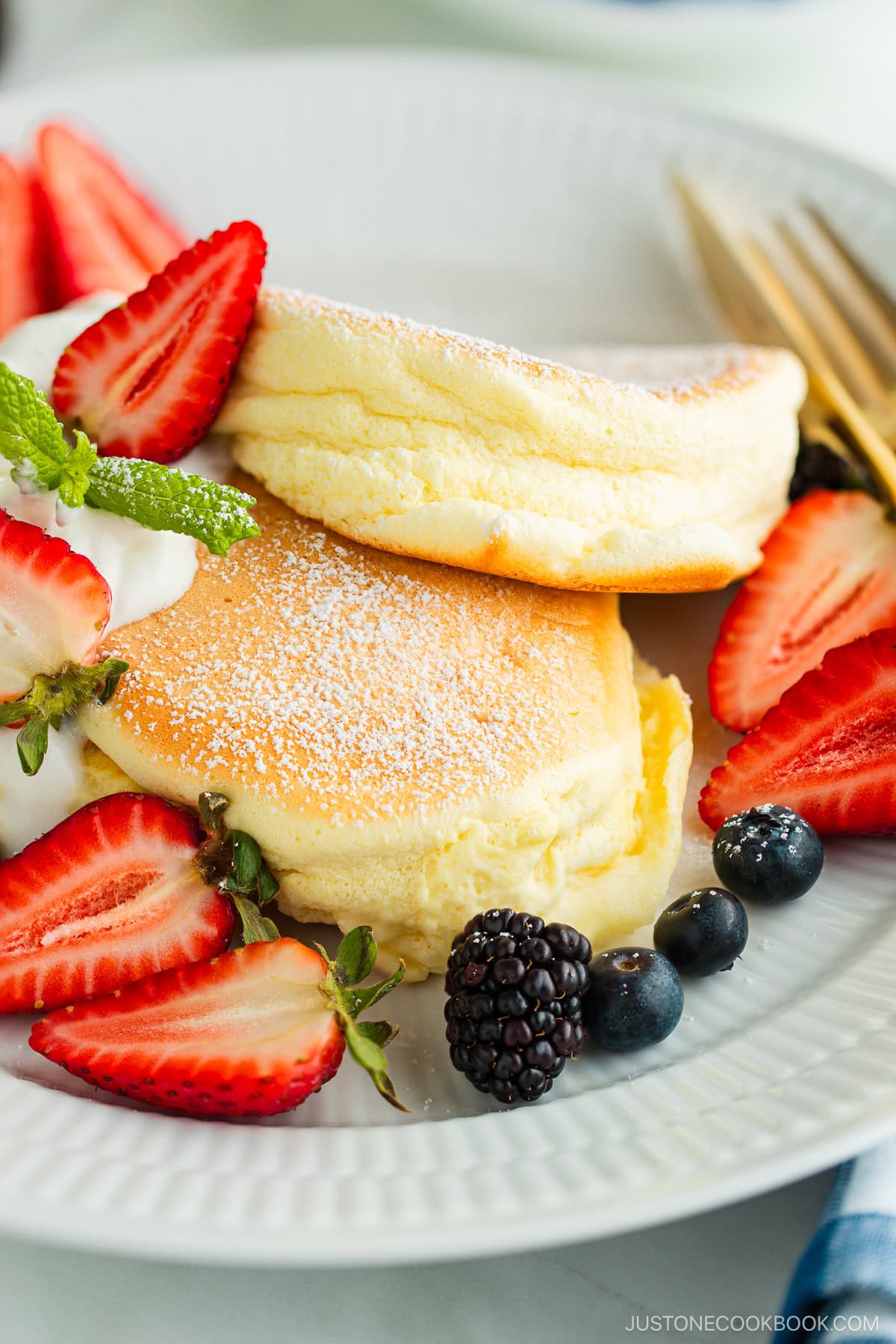
The Japanese take pancakes to new heights with Fluffy Japanese Soufflé Pancakes (スフレパンケーキ). Tall, soft, and super airy, these special pancakes are a must-try recipe for your weekend breakfast. I’ll share my techniques for how to whip up an airy batter and use low-and-slow cooking to make the best soufflé pancakes at home!
If you’re craving more delicious breakfast recipes, try my Matcha Soufflé Pancakes, Shokupan (Japanese Milk Bread), and Steamed Cake (Mushi-pan) next!
Why I Love This Recipe
- So pillowy soft and delicious! – These delicate pancakes are extra fluffy compared to regular flapjacks thanks to the air bubbles whipped into the egg whites. I love the fizzy sound of air bubbles escaping when I cut into them!
- A comforting weekend treat – Pancakes are the happiest comfort food. This recipe is the perfect cooking project for a leisurely weekend brunch or a special occasion—think birthdays, anniversaries, Mother’s Day, or Valentine’s Day.
- Works with creative toppings – I love serving these with fresh whipped cream and berries, but you can get creative with your favorite syrups, sauces, fruit, and other toppings.
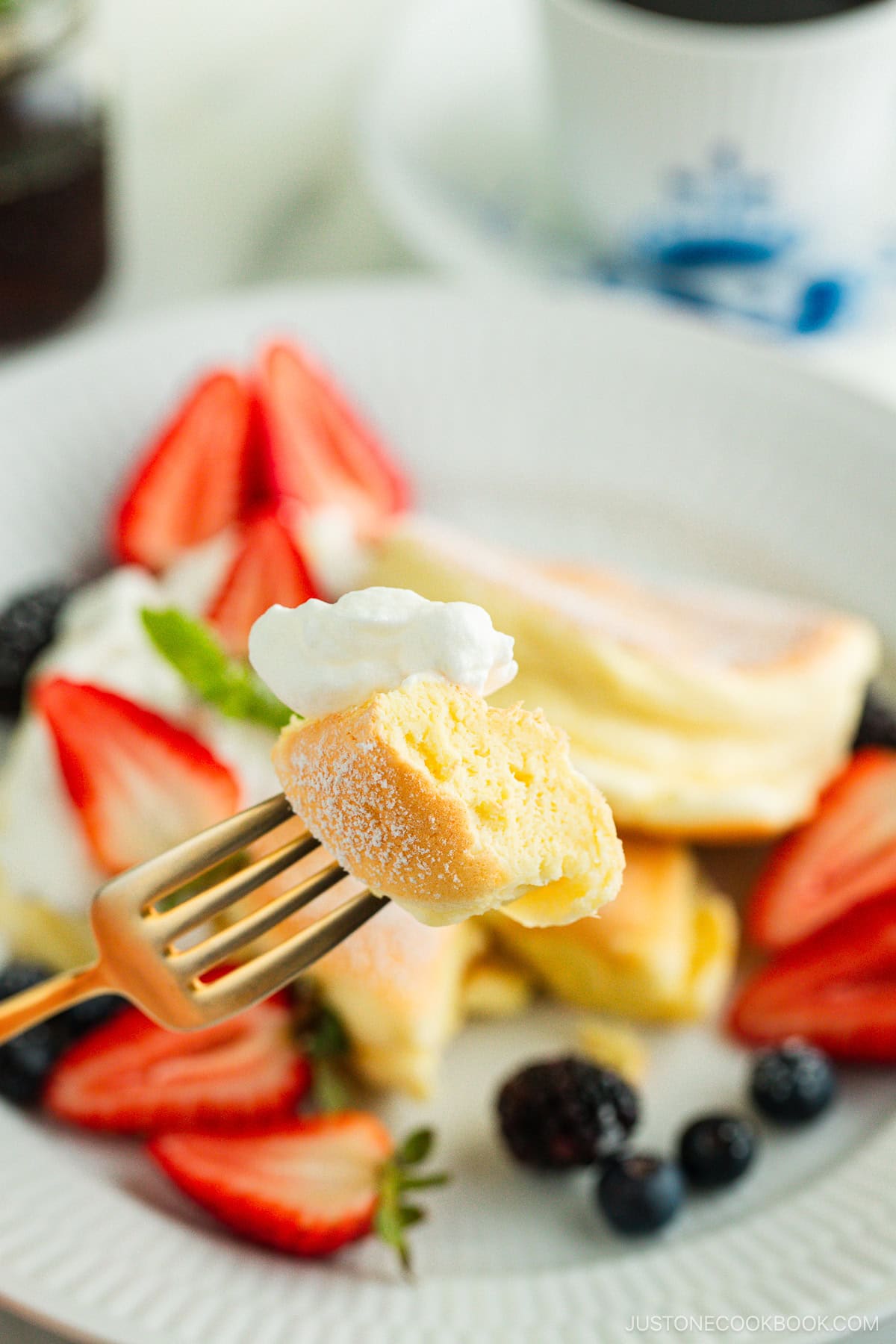
Ingredients for Japanese Soufflé Pancakes
- large eggs
- cake flour
- whole milk
- sugar
- vanilla extract
- baking powder
- neutral oil – for greasing the pan
- water – for steaming
- Toppings:
- confectioners’ sugar
- maple syrup
- heavy (whipping) cream and sugar – optional, for the fresh whipped cream; see how I make it in the recipe below
- fresh berries – optional; I love using strawberries and blueberries
Find the printable recipe with measurements below.
Substitutions
- Cake flour – If you don’t have cake flour on hand, you can make it at home! For every 1 cup of all-purpose flour, remove 2 Tbsp of it and replace with 2 Tbsp of cornstarch. Sift together 3–5 times and it’s ready to use.
Key Equipment
- Hand mixer or stand mixer with a balloon whisk attachment (to whip the egg whites)
- Hand whisk
- Large nonstick frying pan with lid
- Offset spatula
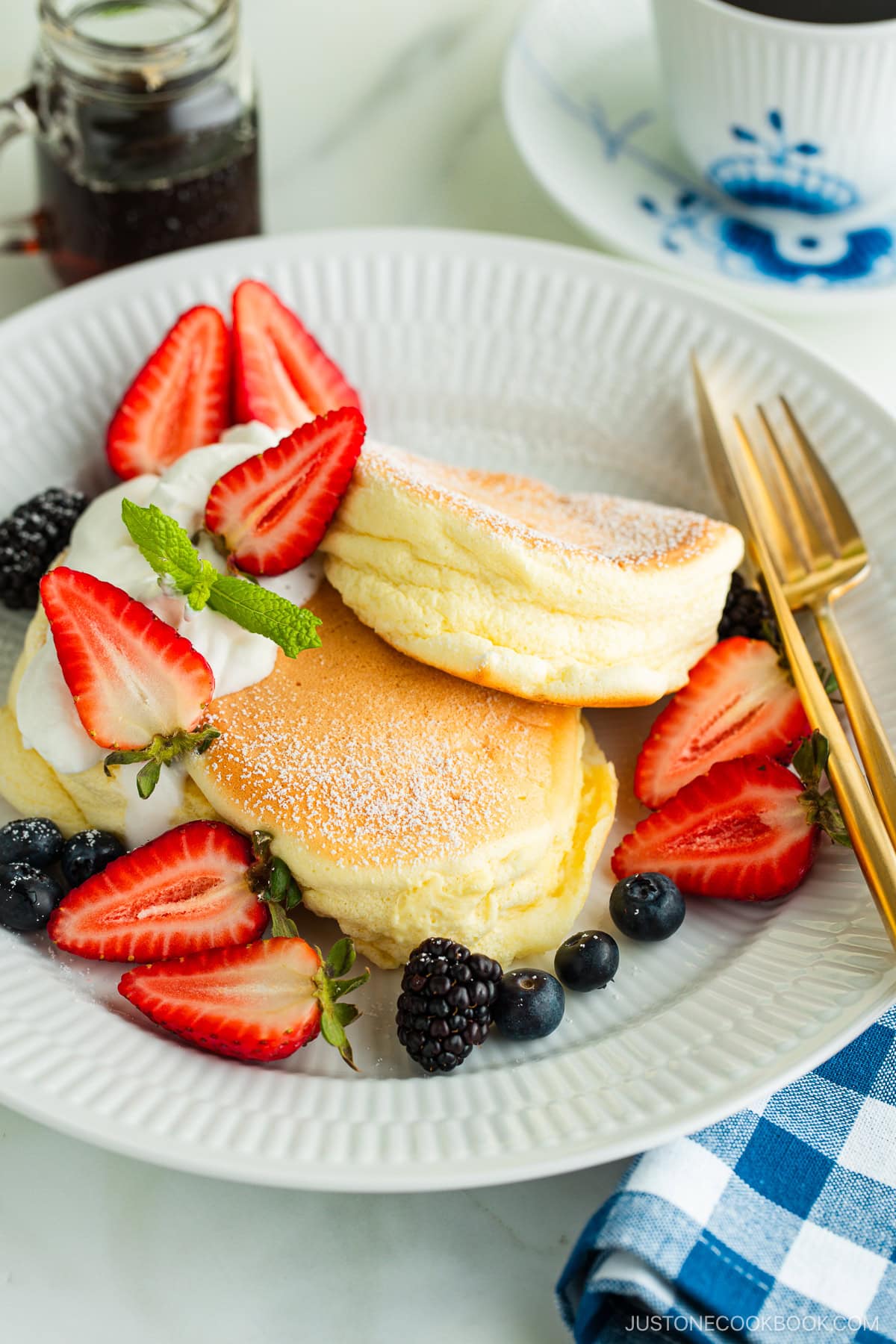
How To Make Soufflé Pancakes
Preparation
Step 1 – Mix the batter. Separate the egg whites and yolks into two bowls and put the bowl of whites in the freezer for 15 minutes. Whisk the yolks, milk, and vanilla extract with a mixer until thick and frothy. Sift the flour and baking powder into the liquid mixture and whisk by hand to combine; do not overmix.
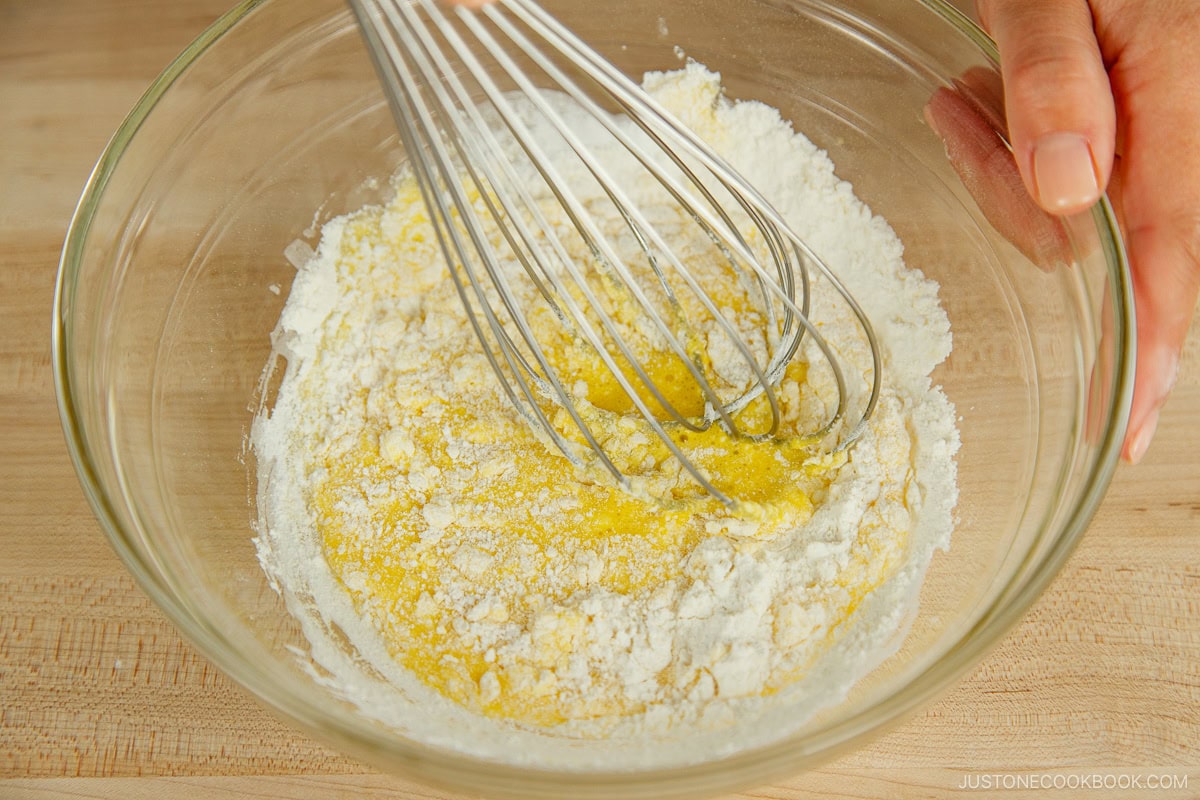
Step 2 – Make the meringue and preheat the pan. Beat the half-frozen egg whites until frothy and opaque. Gradually add the sugar while beating at high speed until stiff peaks form. Look for meringue that holds a peak and has a tip that folds over. Start preheating a large, nonstick frying pan to 300ºF (150ºC) on the lowest heat and lightly grease it with oil.
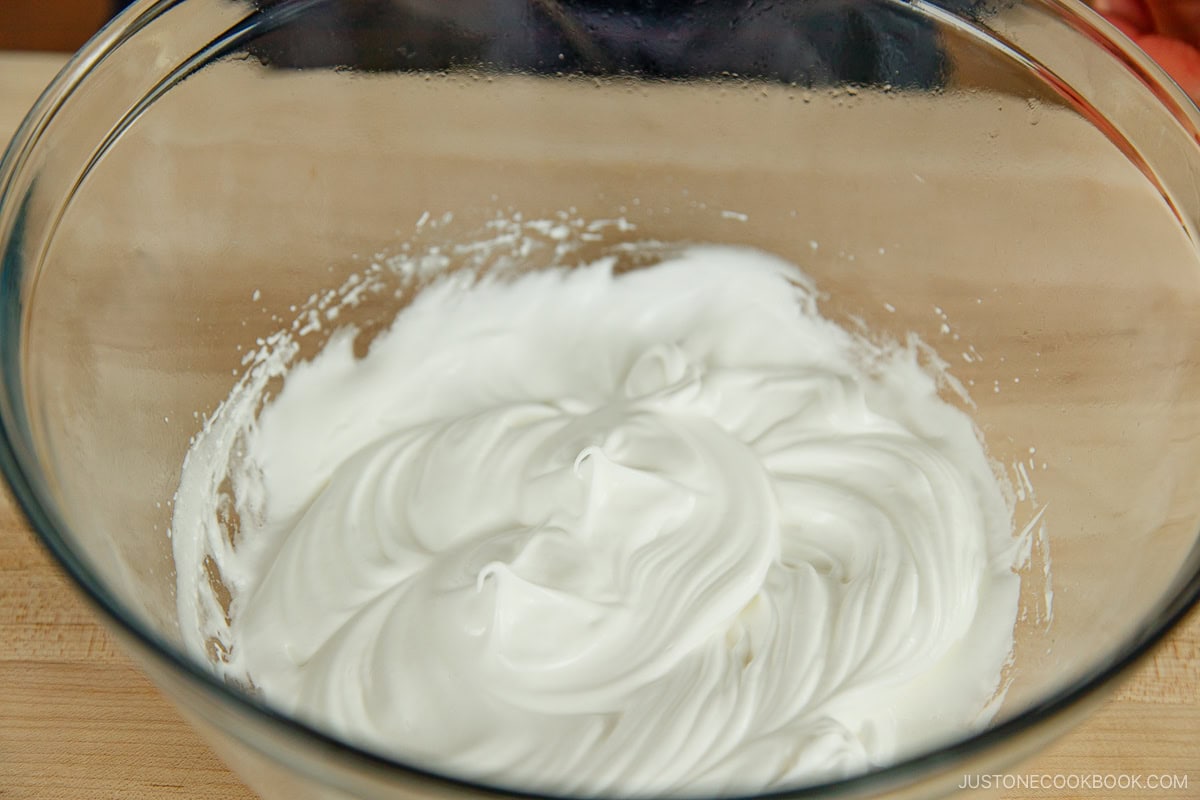
Step 3 – Gently fold the meringue into the batter by hand. Use a hand whisk to fold in the whipped egg whites, one-third at a time. Gently incorporate without breaking the air bubbles. Mix until well combined and homogeneous.
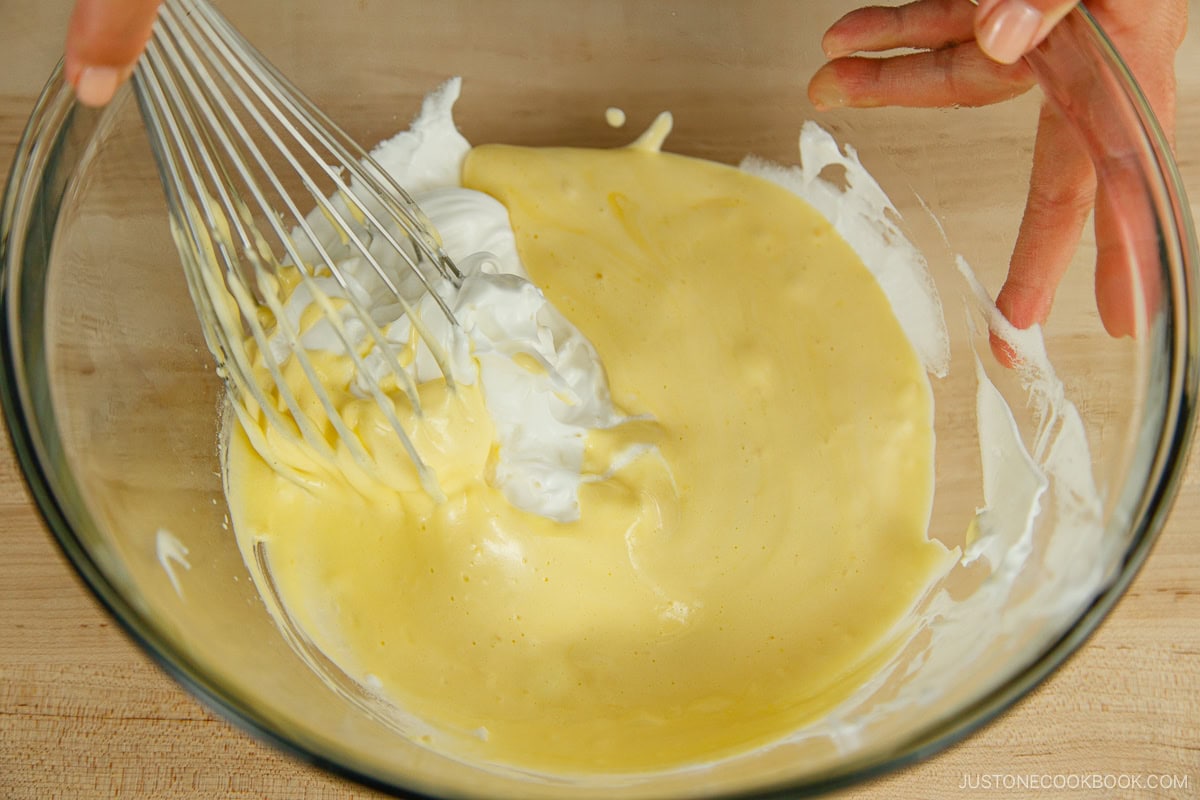
Cooking
Step 4 – Stack three scoops of batter for each pancake. Keep your preheated frying pan at 300ºF (150ºC) over low heat at all times. For the first pancake, place one small scoop of batter in the pan in a tall mound. Then, stack a second scoop on top. Repeat to make the other two pancakes. Then, mound a third scoop onto each, keeping the batter piled high.
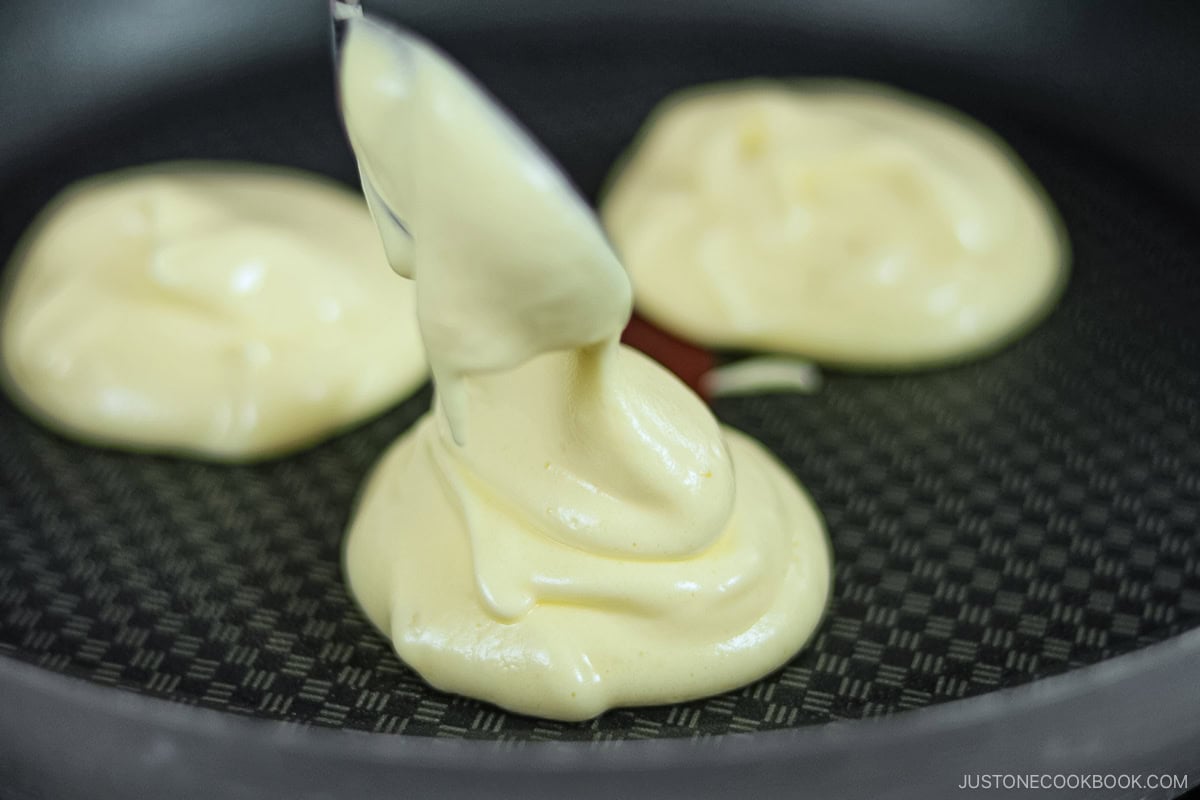
Step 5 – Add water, cover, and set a timer for 6–7 minutes. A splash of water in the pan creates steam and covering with a lid locks in the moisture. After 2 minutes, add a final scoop of batter to each pancake. Cover and keep cooking.
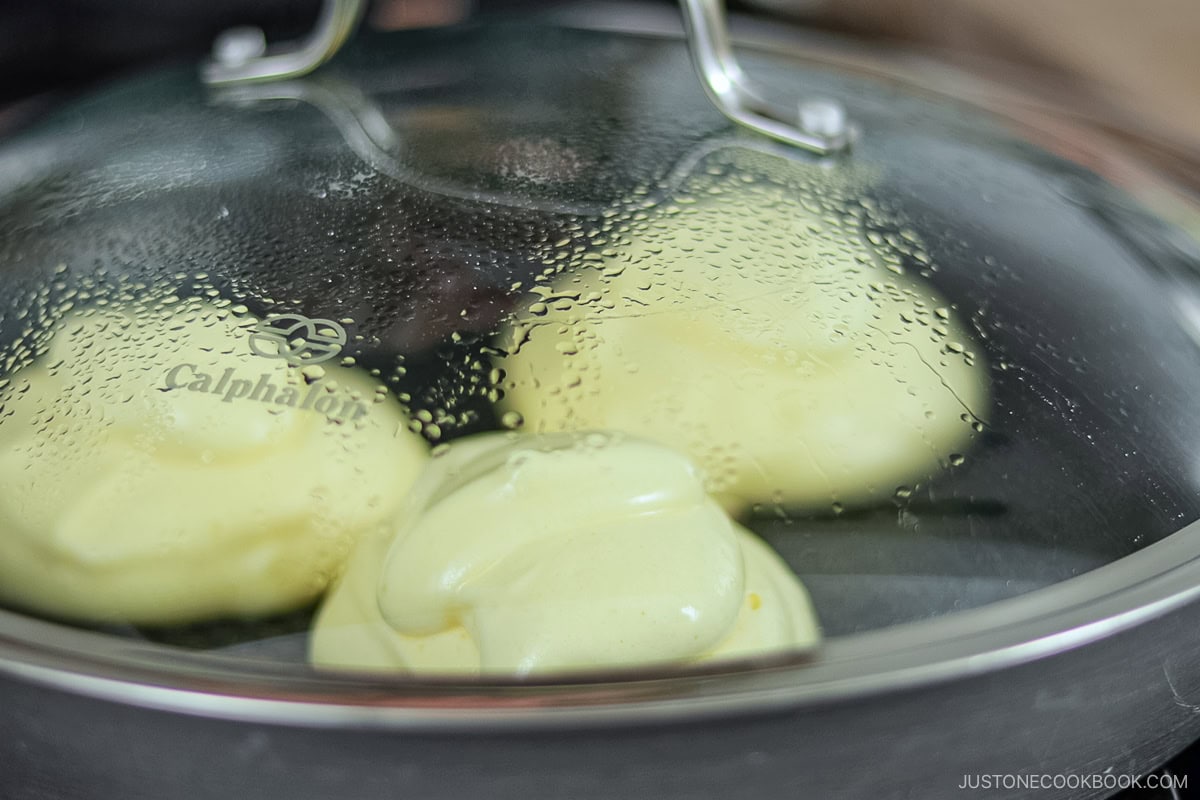
Step 6 – Flip over, add more water, and cover to finish cooking. When the timer goes off, use an offset spatula to very gently flip the pancakes with a “rolling over” motion. Add another splash of water and cover the pan. Set the timer for 4–5 minutes and cook until the other side is nicely browned.
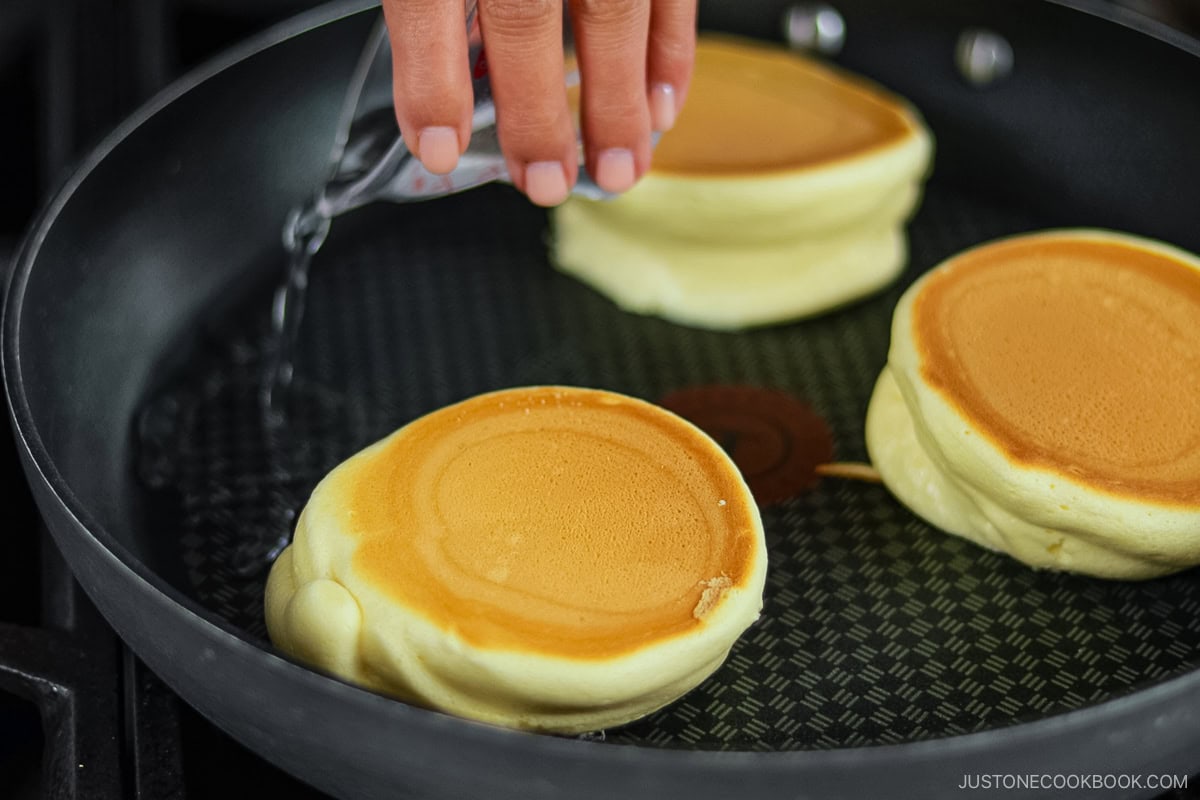
Step 7 – Serve! Transfer to individual plates. Dust with confectioners’ sugar and drizzle with maple syrup. I love topping them with fresh whipped cream and fresh berries. Enjoy!
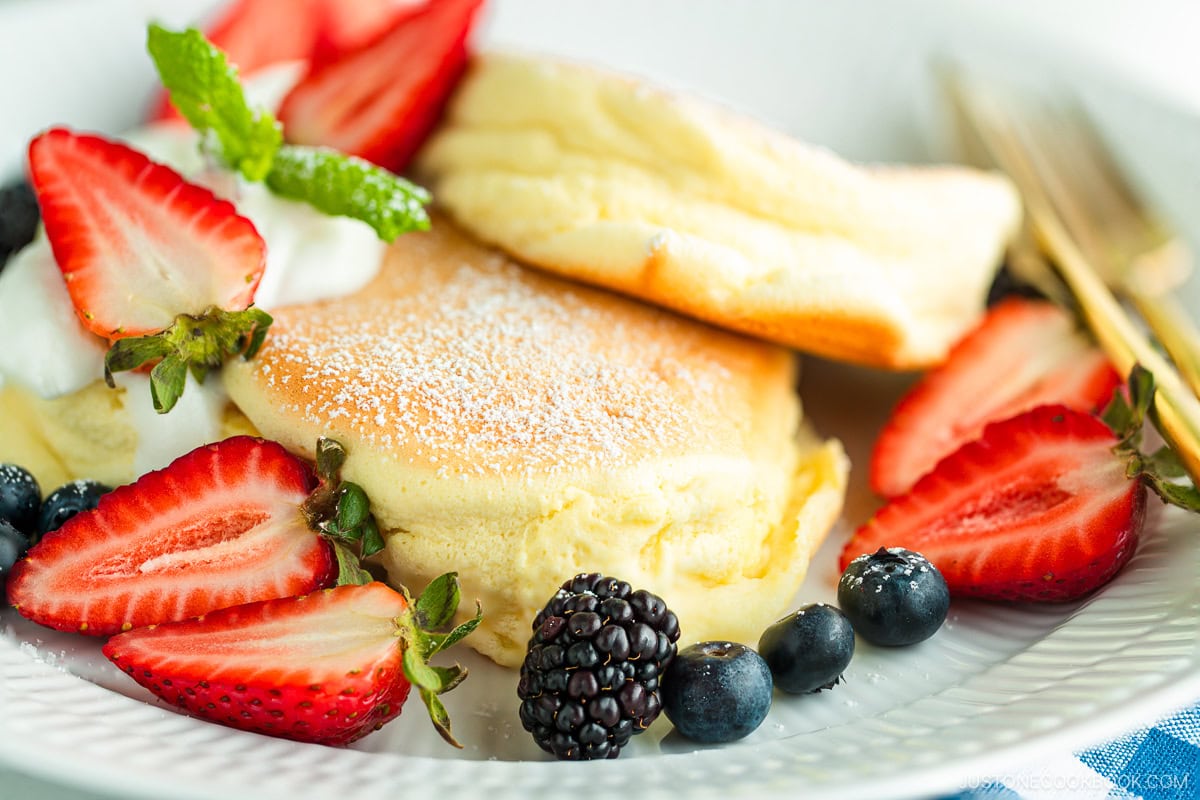
Nami’s Recipe Tips
- Beat the egg whites to stiff peaks – When you lift up the whisk, the egg whites should stand straight up while the very tip folds over, like it’s taking a bow. Making meringue takes practice, but I promise it gets easier once you know how to achieve the right consistency.
- Preheat the pan thoroughly and evenly – Even heating is crucial for the pancakes to cook through. It also gives you full control over the cooking time and final result. To prevent hot spots, I suggest preheating your pan slowly on the lowest setting.
- Pile the batter high – The key to making lofty pancakes is to add a new pile on top of the batter already in the pan once the pancake starts to form.
- Cover and cook it steady, slow, and low – This is the key point for properly cooking the interior of these thick pancakes. If you use higher heat, they may look done, but the inside will be raw and the pancakes will deflate once the temperature drops. To lock in the heat and moisture while cooking, be sure to cover the pan with a lid.
- Add water to create steam – At two different times, I add 1 Tbsp of water to the empty spaces in the frying pan to create a moist cooking environment.
- Flip very gently with a “rolling over” motion – I pull the pancake slightly with an offset spatula to create an empty space, then gently roll it over. If it’s stuck, give it time to firm up before you try to flip it. Handle with care to avoid cracking or deflating them.
Variations and Customizations
- Make it with matcha. If you’re a fan of Japanese green tea powder, add matcha to the batter! It gives the pancakes a wonderful green hue and flavor boost. You can see how I make it in my Matcha Soufflé Pancakes recipe.
- Switch up the toppings. The sky’s the limit when it comes to toppings! While berries are classic, you can try peaches, mangoes, or whatever is ripe and in-season. You could also add a dollop of jam, fruit preserves, or lemon curd. Instead of maple syrup, try drizzling kuromitsu (Japanese black sugar syrup), chocolate sauce, or strawberry sauce on top. Chocolate chips are another popular choice.
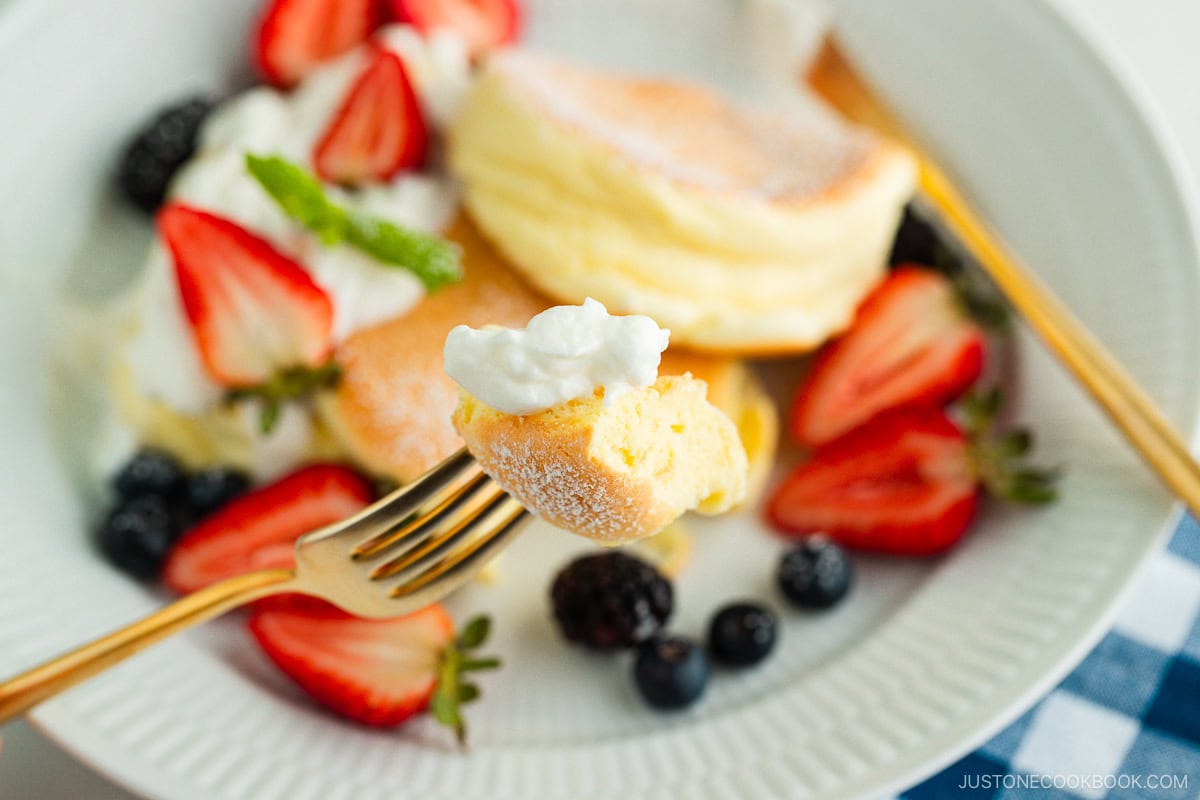
What To Serve with Japanese Soufflé Pancakes
I love to serve these pancakes with a delicious morning drink:
- Hot beverage: Matcha Latte is creamy, earthy, and so easy to make at home.
- Iced beverage: With a rich aroma, Iced Hojicha Latte is a popular cafe drink in Japan!
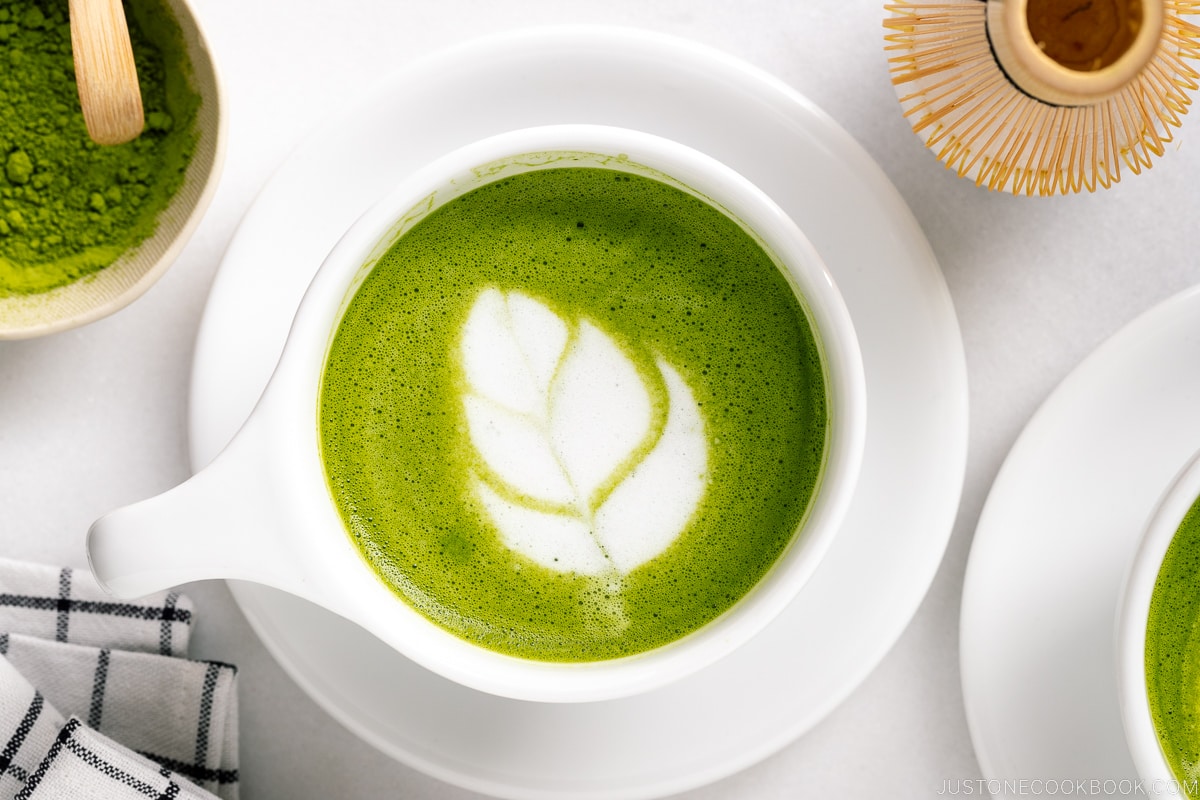
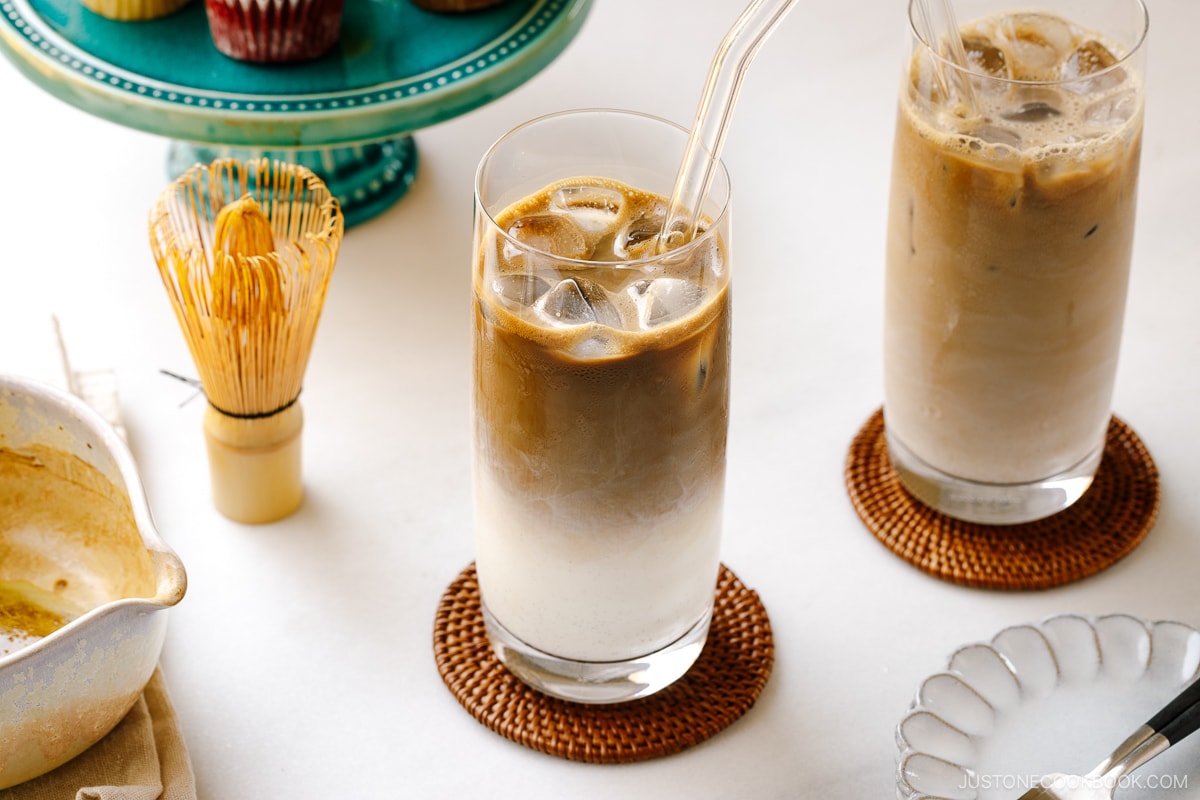
Storage Tips
To store: For the fluffiest texture, I recommend making these soufflé pancakes just before serving. If you have leftovers, transfer them to an airtight container and store in the refrigerator for up to 2 days. I don’t recommend freezing them.
Frequently Asked Questions
Why are my soufflé pancakes flat?
Properly cooked soufflé pancakes will have a solid structure and height that will hold for 10–15 minutes as long as they are warm (just like hot air balloons). If they collapse when you move them to a plate, there are two possible reasons why.
First, you may have underbeaten or overbeaten the egg whites. You want to achieve stiff peaks to create air bubbles that give structure to the pancake. Without them, the pancake will deflate as soon as the temperature drops. For stiff peaks, look for egg whites that stand straight up and folds over at the very tip when you lift the whisk.
Second, the stove’s heat may have been too strong. Just because the pancake is nicely browned, it doesn’t mean it’s done. The inside might still be raw and undercooked. If you move it out of the pan before the interior is cooked, the air will deflate. To avoid this, cover the pan and cook on the lowest heat setting. These tall and thick pancakes will take much longer to cook through than a standard pancake.
How do I make more than 3 pancakes at a time?
To make two or more servings, you will need multiple nonstick frying pans on the stove. Alternatively, you can use an electric or cast iron griddle with a lid. At soufflé pancake restaurants in Japan, they use multiple electric griddles with a lid. The staff would usually tell you the soufflé pancakes will take at least 20 minutes to make.
Can I use other sugar?
I’ve demonstrated this recipe using white granulated sugar, but I often make it with organic cane sugar. You can use the sugar in your pantry but it may alter the flavor.
More Breakfast and Brunch Recipes
If you love this recipe for Fluffy Japanese Soufflé Pancakes, you’re in for a treat with these other irresistible breakfast and brunch recipes that are popular in Japan.
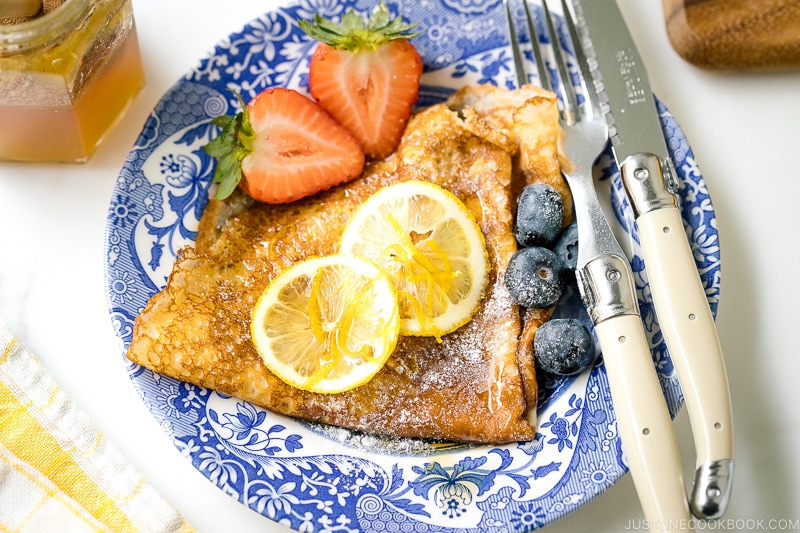
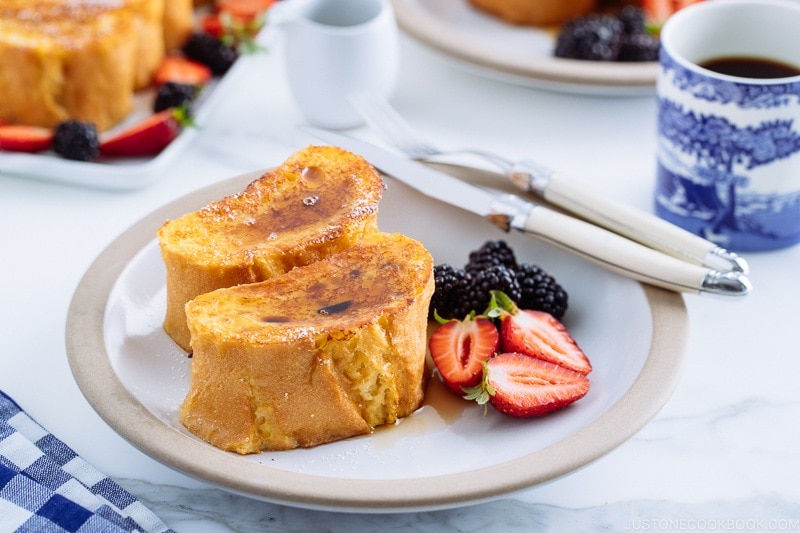
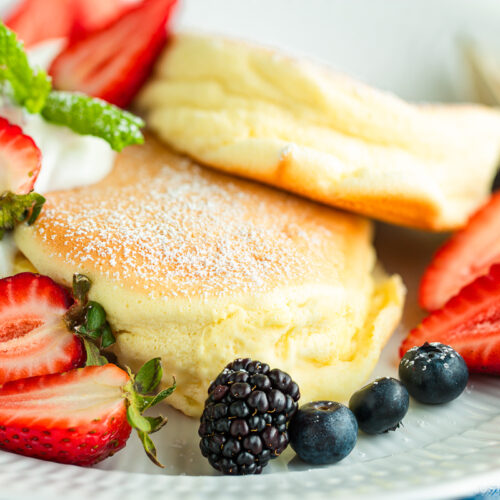
Prep Time: 15 minutes
Cook Time: 15 minutes
Chilling Time: 15 minutes
Total Time: 45 minutes
Servings: 3 pancakes (1 serving)
- ▢ 2 large eggs (50 g each w/o shell)
- ▢ 1½ Tbsp whole milk (I haven‘t tried reduced-fat, low-fat, nonfat, or plant-based milk for this recipe as I believe the batter will be too thin to make souffle pancakes)
- ▢ ¼ tsp pure vanilla extract
- ▢ ¼ cup cake flour (weigh your flour or use the “fluff and sprinkle“ method and level it off; you can make homemade cake flour)
- ▢ ½ tsp baking powder
- ▢ 2 Tbsp sugar
- ▢ 1 Tbsp neutral oil (for greasing the pan)
- ▢ 2 Tbsp water (for steaming)
For the Fresh Whipped Cream (optional)
- ▢ ½ cup heavy (whipping) cream
- ▢ 1½ Tbsp sugar (add more if you like it sweeter)
For the Toppings
- ▢ 1 Tbsp confectioners’ sugar
- ▢ fresh berries (strawberries, blueberries, etc.)
- ▢ maple syrup
Japanese Ingredient Substitution: If you want substitutes for Japanese condiments and ingredients, click here.
Gather all the ingredients. I highly encourage you to use metric measurements using a kitchen scale for this recipe. Click on the “Metric“ button at the top of the recipe to convert the ingredient measurements to metric. You will also need a 12-inch nonstick frying pan (large enough to cook 3 pancakes at the same time) with a lid. It‘s also nice to have an infrared thermometer gun to check the temperature of the frying pan.
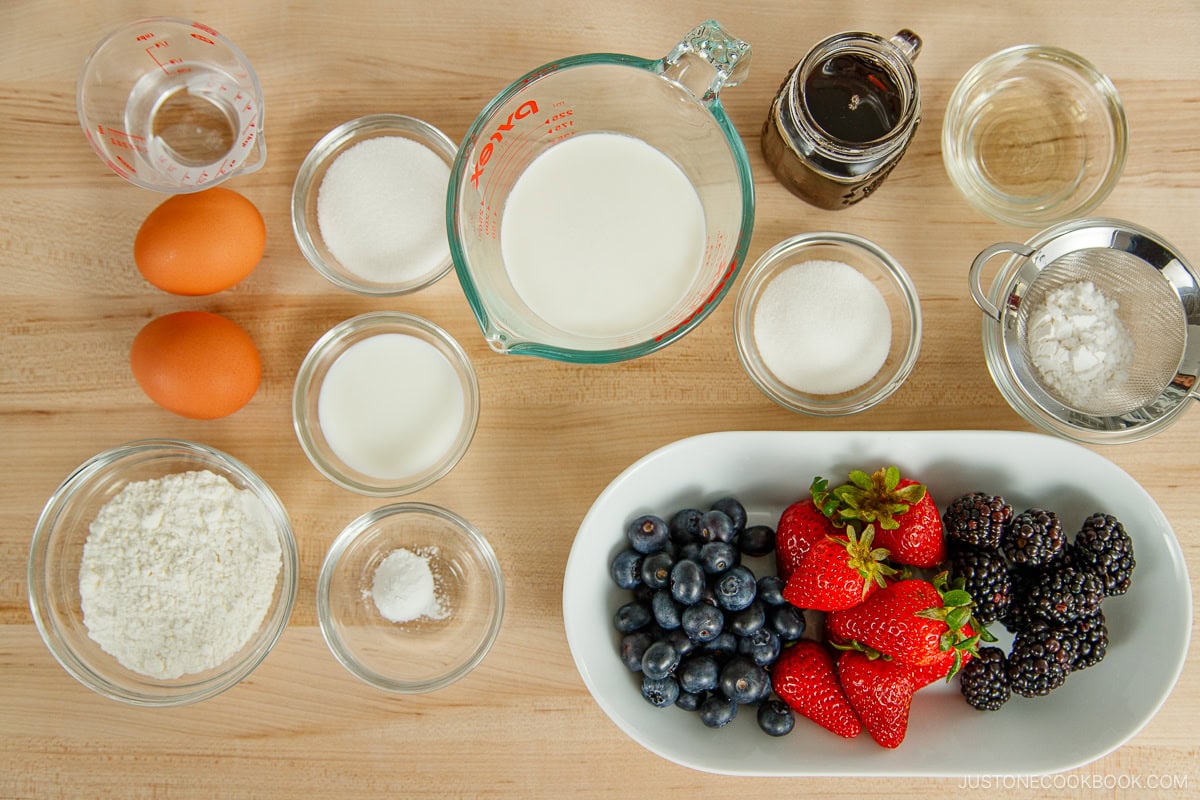
To Make the Fresh Whipped Cream (optional)
If you‘d like to serve the Fluffy Japanese Soufflé Pancakes with optional fresh whipped cream, make it now. First, prepare an ice bath: Put ice cubes and water in a large bowl and place a clean and dry medium bowl on top of the ice water. Add ½ cup heavy (whipping) cream and 1½ Tbsp sugar to the medium bowl to keep them cold.
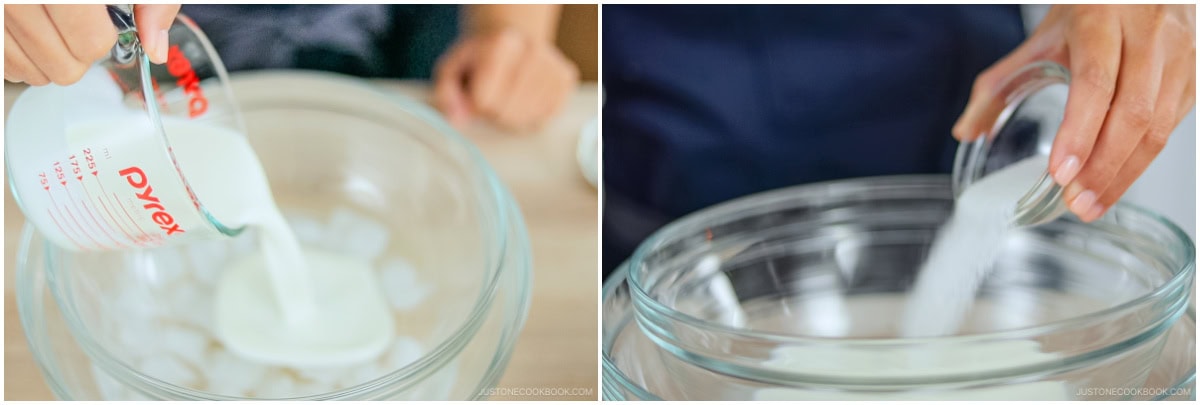
Whisk on high speed until medium to firm peaks form. The cream should not be runny but soft, fluffy, and firm instead. Keep the whipped cream chilled until you‘re ready to serve the pancakes.
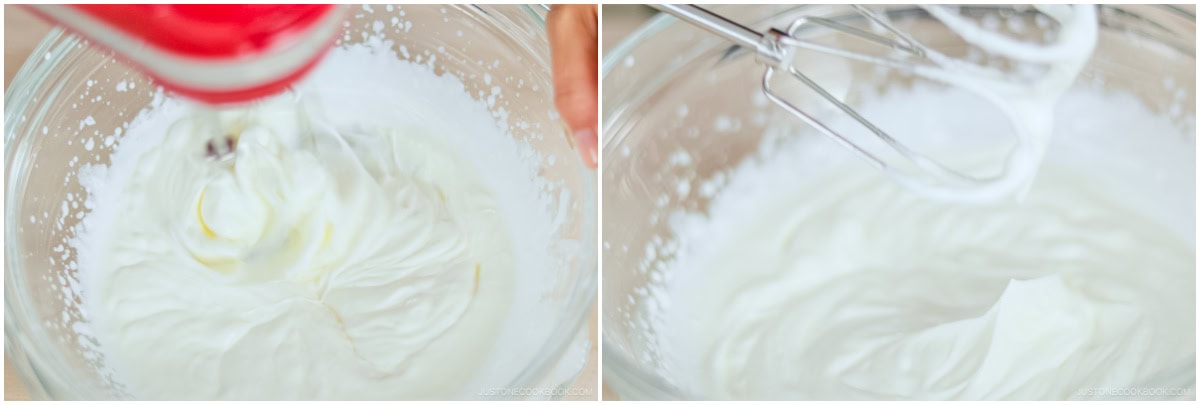
To Mix the Batter
Separate 2 large eggs (50 g each w/o shell) into whites and yolks in two different bowls. Put the bowl with the egg whites in the freezer for 15 minutes. Why do we partially freeze the egg whites? Please read why in my post 2 Tips to Make Perfect Meringue (Egg Whites).
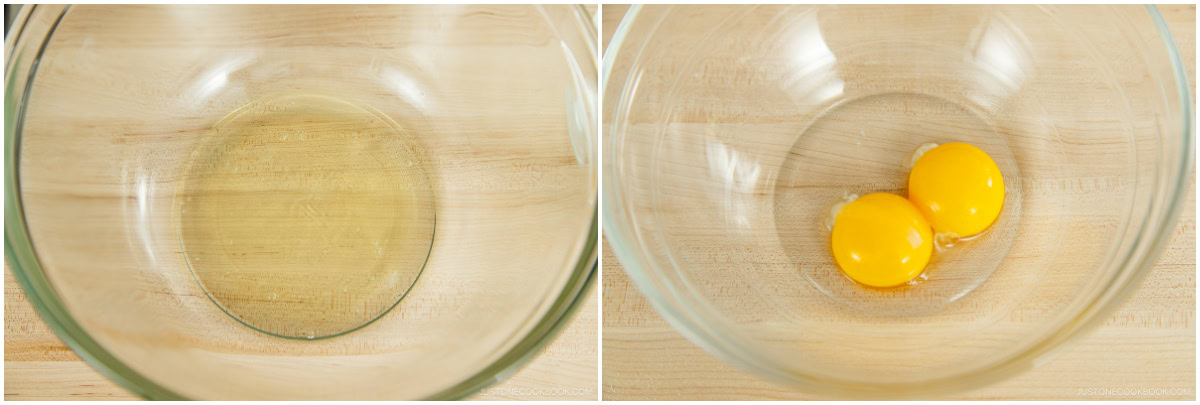
In the meantime, add 1½ Tbsp whole milk and ¼ tsp pure vanilla extract to the egg yolks and whisk using a hand whisk until thick and frothy.
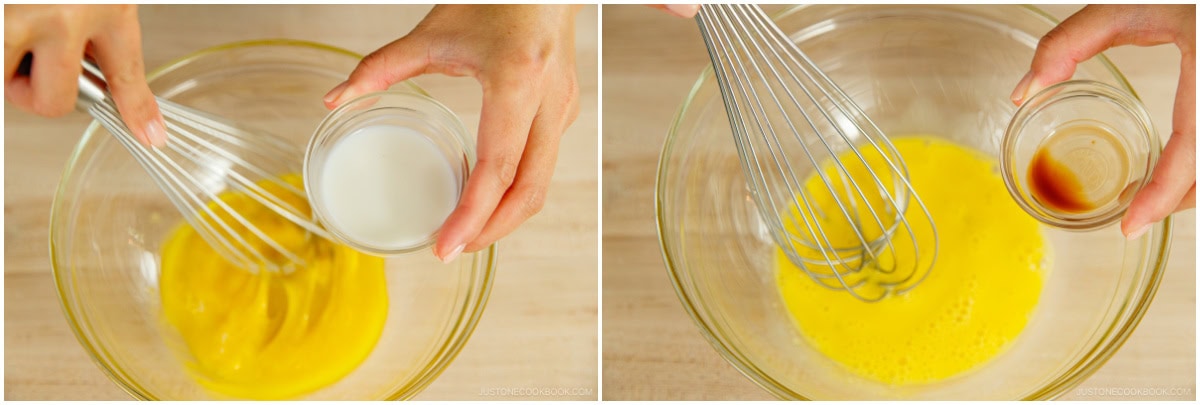
Sift ¼ cup cake flour and ½ tsp baking powder into the bowl.
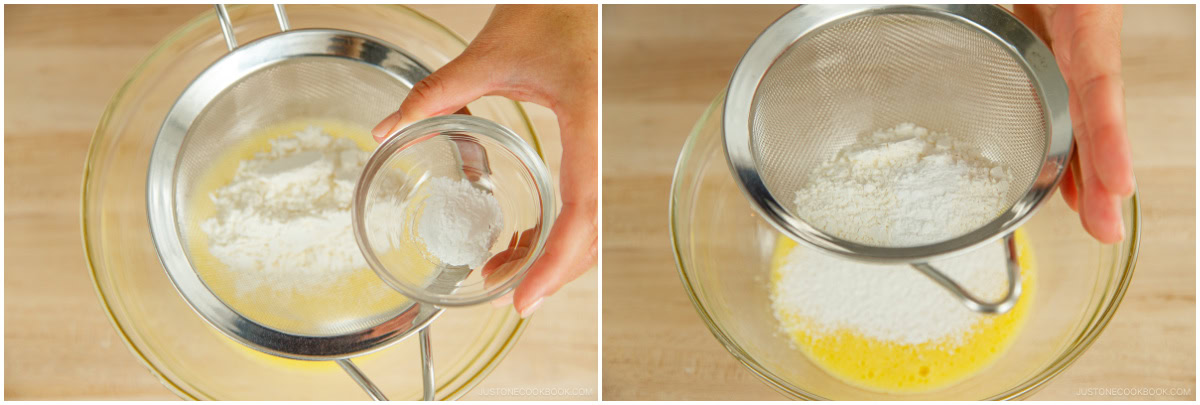
Whisk to combine thoroughly; do not overmix. Set aside while you make the meringue.
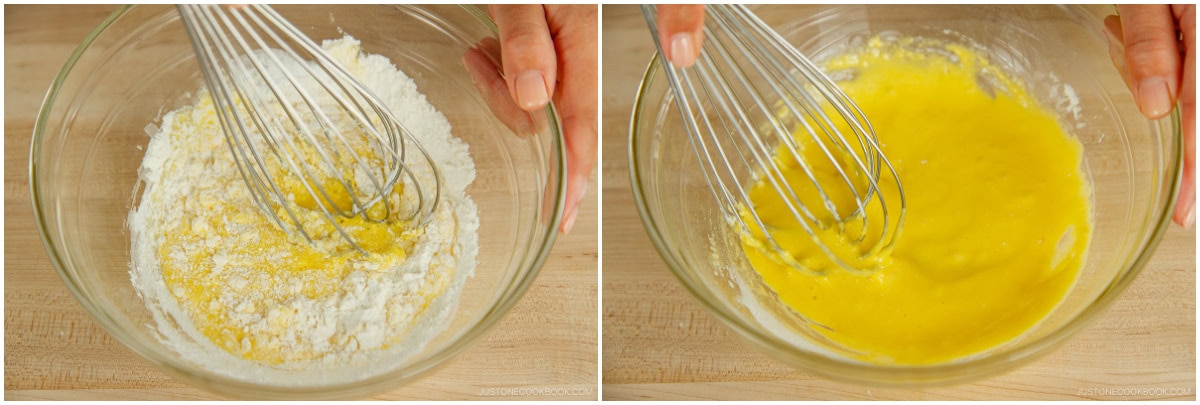
To Make the Meringue
After 15 minutes, take out the bowl with the egg whites from the freezer. The egg whites should be half frozen. Now, start beating the egg whites with a hand mixer (you can also use a stand mixer or balloon whisk).
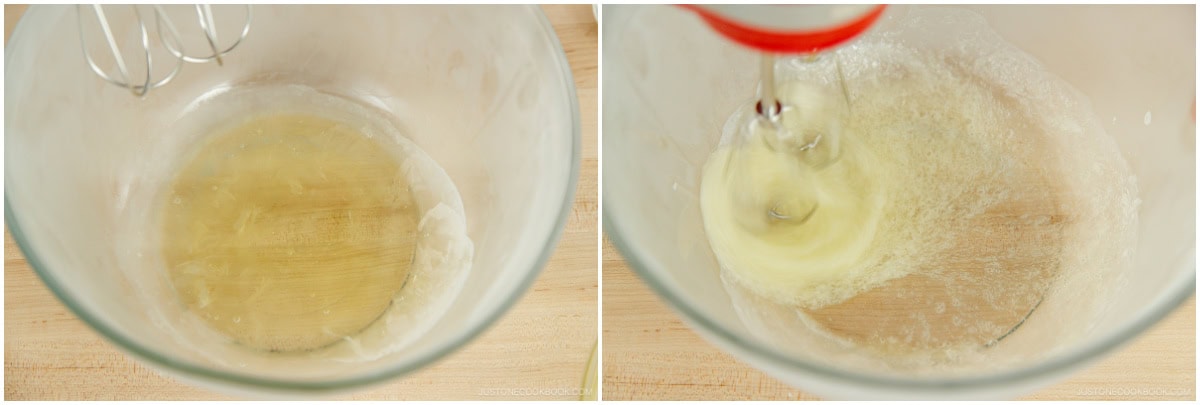
When the egg whites turn frothy and opaque, gradually add in 2 Tbsp sugar, roughly one-third of it at a time. Then, increase the mixer speed to high (Speed 10) and beat vigorously until stiff peaks form (see the next step for how to check). It takes about 2 minutes of beating at high speed to reach stiff peaks. Tip: When using a stand mixer, I usually pause beating when the meringue is almost done. Take off the whisk attachment from the mixer and use it to hand-mix the looser egg whites near the bowl's edge into the stiffer whites near the center until it's all homogenous in texture. Then, put the whisk back on and continue beating.
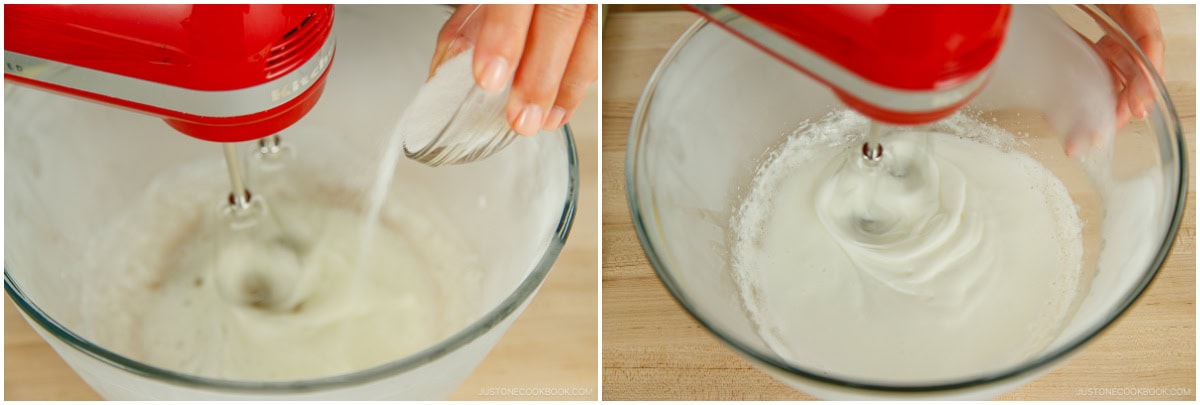
To check for stiff peaks, stop whisking and pull up your beaters or whisk. The meringue in the bowl or on the whisk should be firm enough to hold a peak, pointing straight up (or maybe folding over a little bit just at the very tips). By this time, the meringue should have a glossy texture, too. Tip: If you overbeat the meringue, it will become very stiff and grainy and won't incorporate into the batter at all.
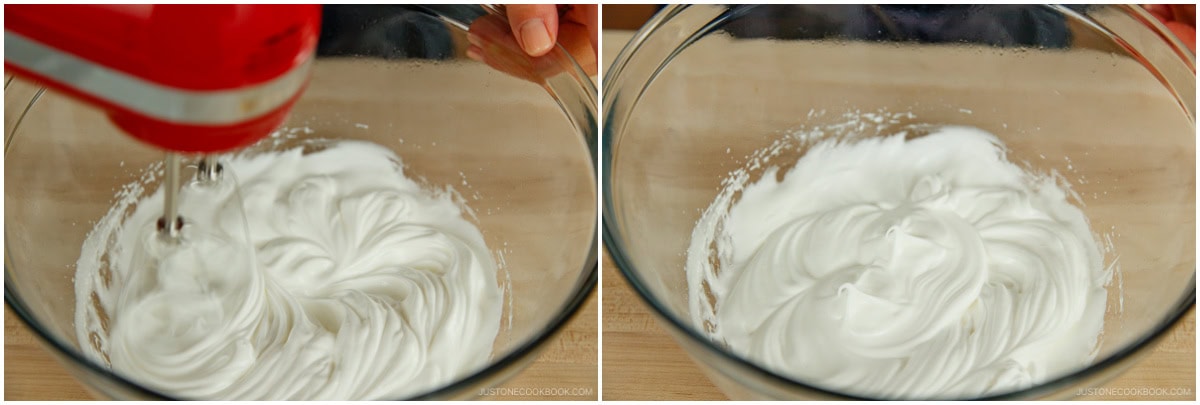
Heat a large nonstick frying pan to 300ºF (150ºC) over the lowest heat. Brush with 1 Tbsp neutral oil and lightly remove any visible oil with a paper towel (otherwise the pancakes will have a spotty pattern). Keep the pan on low heat while you fold in the egg white meringue into the egg yolk mixture in the next step.
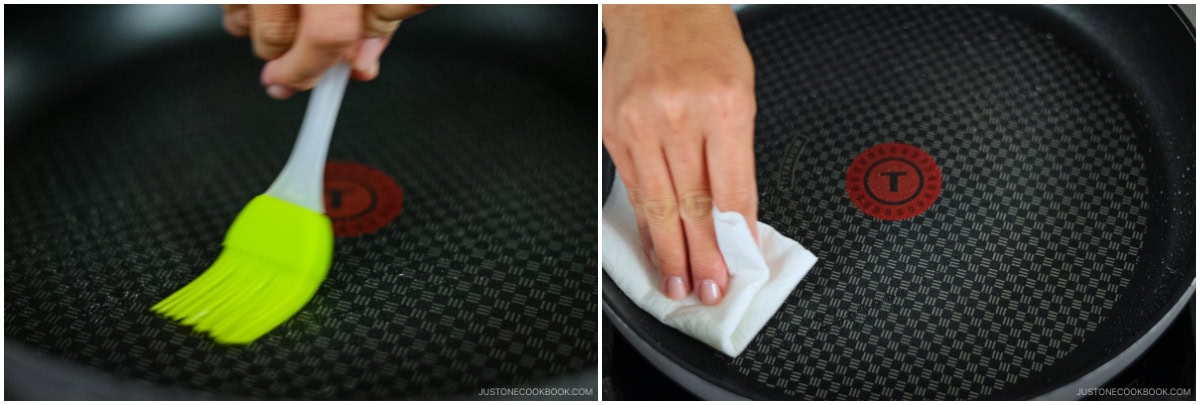
To Fold In the Meringue
Take one-third of the egg white meringue and add to the egg yolk mixture. Whisk together by hand (don’t worry too much about breaking air bubbles at this point).
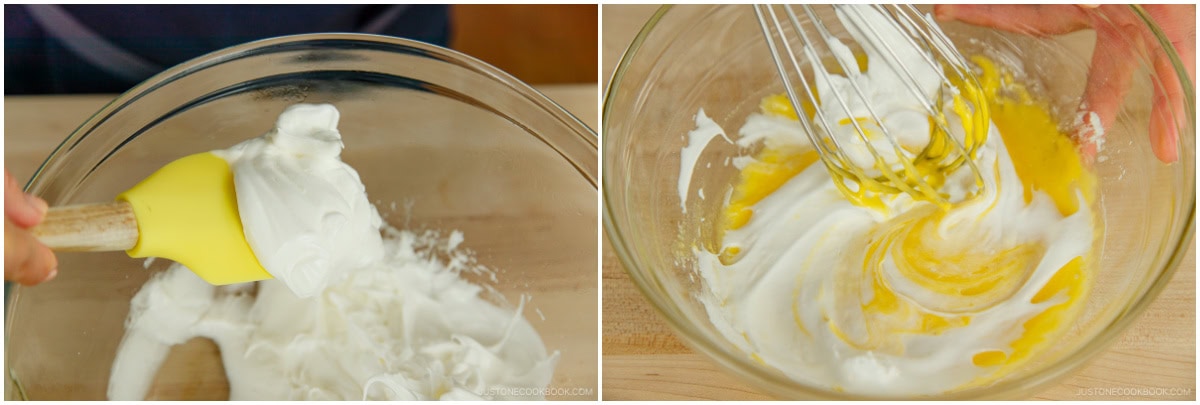
Next, take half of the remaining meringue and add to the egg yolk mixture. Using a hand whisk, gently fold them in without breaking the air bubbles in the egg whites. Why do we use a whisk instead of a silicone spatula? Please read my post 2 Tips to Make Perfect Meringue (Egg Whites).
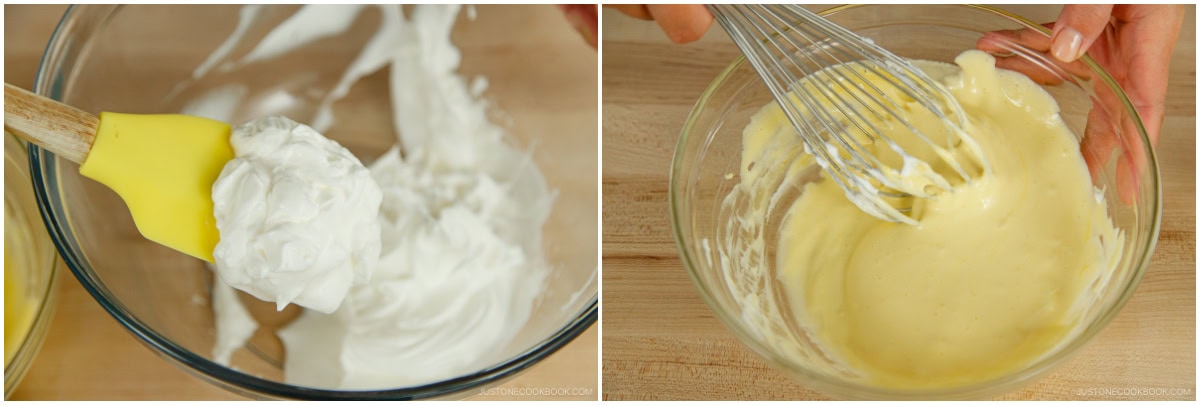
Now, transfer the egg yolk mixture back into the bowl with the remaining meringue. Very gently fold the two mixtures together, taking care not to deflate the air bubbles in the meringue and batter as you fold. Mix the batter very gently until well combined and homogenous.
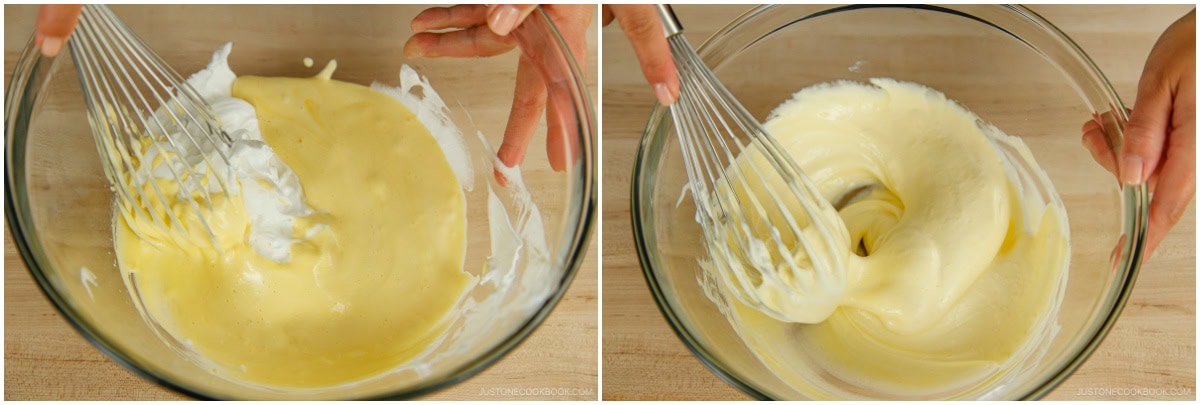
To Cook the Pancakes
Keep your nonstick frying pan heated to 300ºF (150ºC) at all times over low heat. Remember, each pancake gets roughly four small scoops of batter, and you will be making three pancakes. For the first pancake, place one scoop of batter and make a tall mound in the frying pan, using a small ladle or a serving spoon (that’s bigger than a regular spoon—probably 2–3 Tbsp). Next, stack one more scoop of batter onto the first scoop already in the pan. Repeat for the next two pancakes, giving each pancake two scoops of batter.
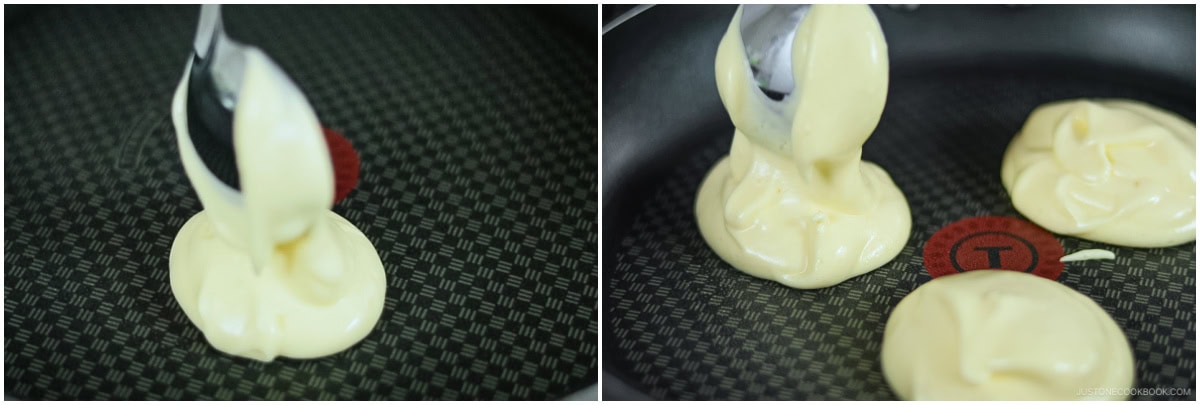
By the time all three pancakes have two scoops, the surface of the batter is slightly dry already. At this point, you can mound one more scoop on top of each pancake, keeping the batter piled up high. In the bowl, you should still have roughly three scoops left (if you have slightly more, that’s okay).
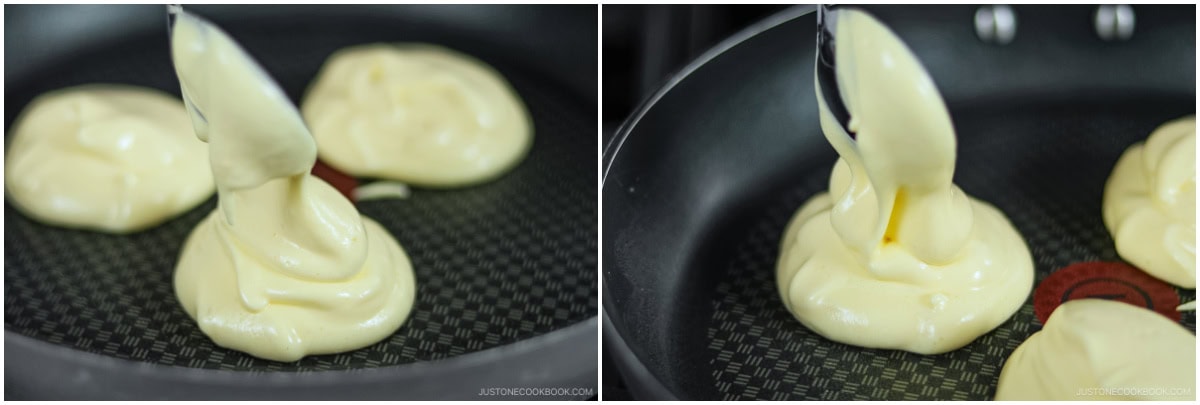
Set the timer for 6–7 minutes and add 1 Tbsp of the 2 Tbsp water in three empty spaces inside the pan. Cover with a lid. The steam from the water keeps the pancakes moist while they cook. Please note: The suggested time is just a guideline; how long you will cook the pancakes is based on the temperature of your frying pan.
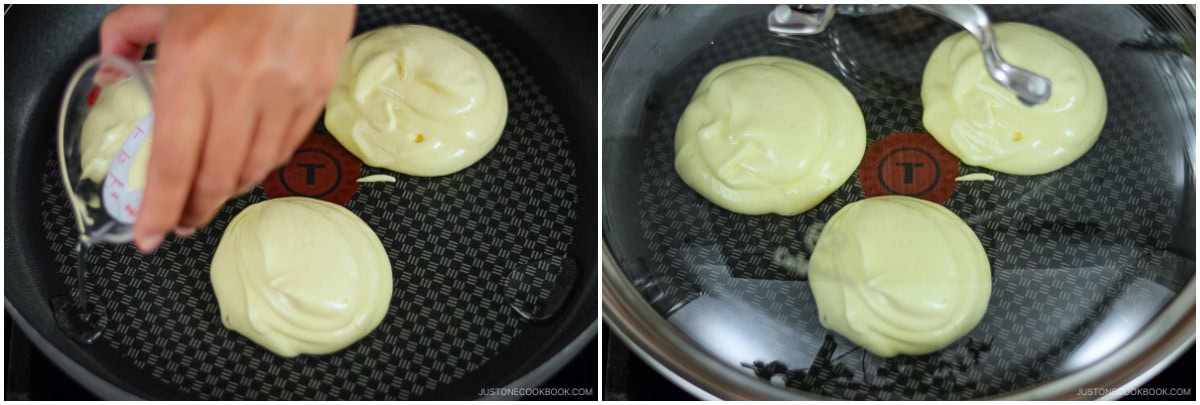
After 2 minutes have passed, open the lid, and add one final scoop of batter to each pancake (or more scoops if you have more batter). Make sure to stack the batter high, not wide. If the water has evaporated, add a little bit more. Cover with the lid and cook.
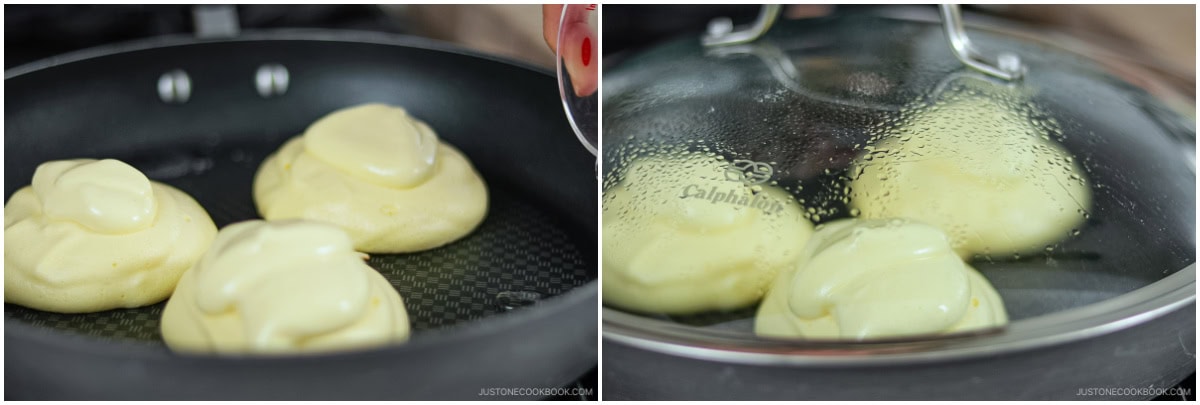
After 6–7 minutes have passed, lift the pancake VERY GENTLY using an offset spatula. If the pancake is stuck, don’t touch it until it firms up a little. If you force it, the pancake will crack in the middle. When the pancake is ready, you can easily move the pancake. Repeat with the other pancakes.
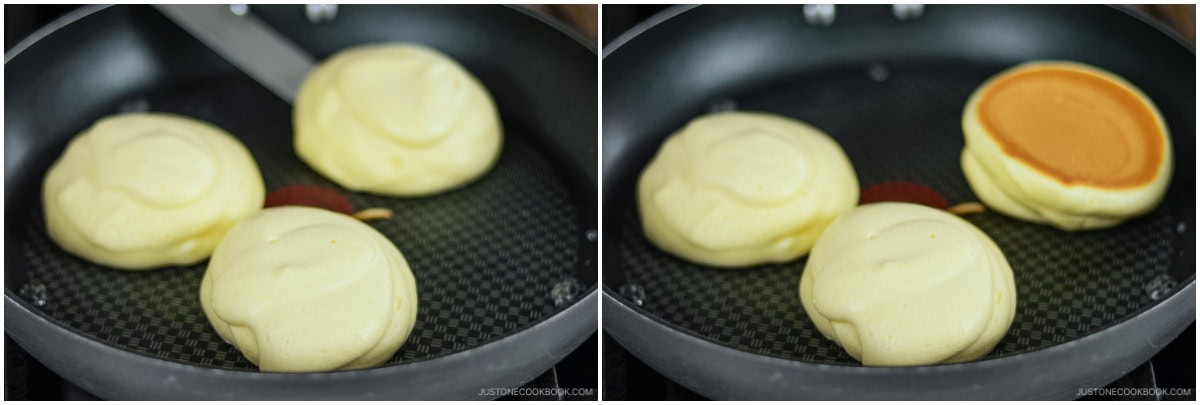
Here is another set of images to show the process. Slightly pull the pancake to create an empty space and gently flip it over with a “rolling over” motion.
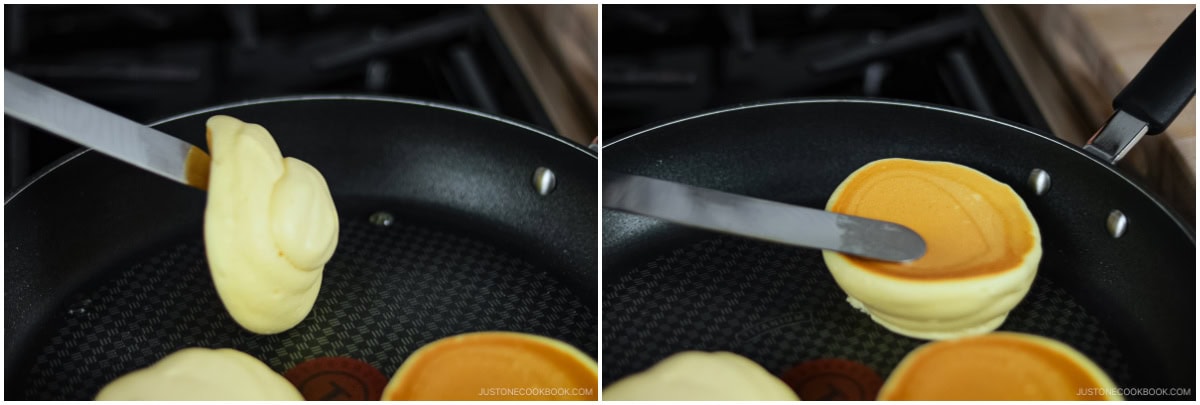
Add another 1 Tbsp water to the empty spaces in the pan and cover. Set the timer for 4–5 minutes to cook the other side on the lowest heat setting.
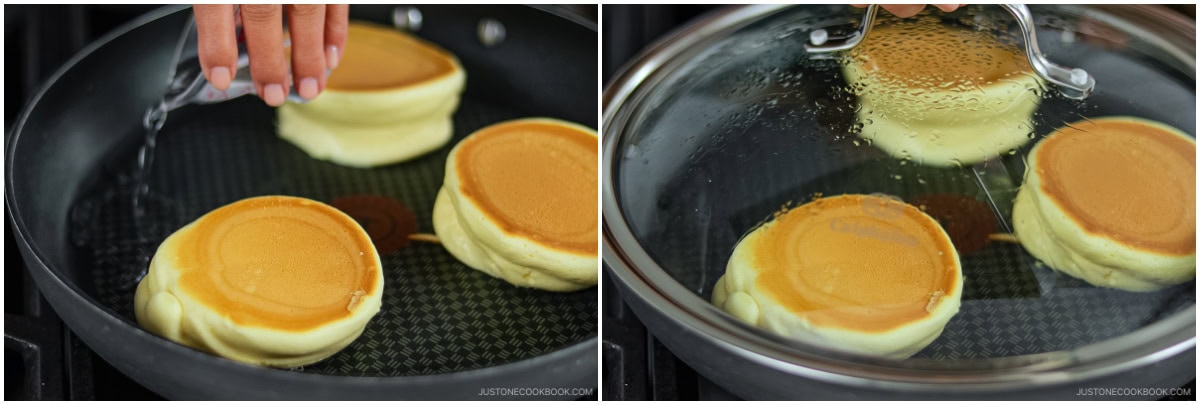
Once they are nicely browned, transfer the pancakes to your serving plates.
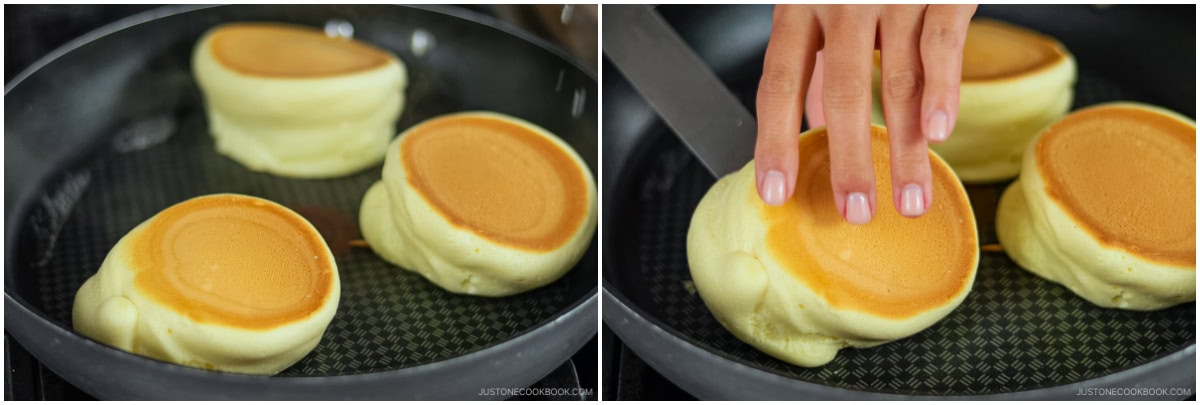
To Serve
Place the optional fresh whipped cream on the pancakes and top with fresh berries. Dust your Fluffy Japanese Soufflé Pancakes with 1 Tbsp confectioners’ sugar and drizzle with maple syrup. Enjoy!

To Store
For the fluffiest texture, I recommend making these soufflé pancakes just before serving. If you have leftovers, transfer them to an airtight container and store in the refrigerator for up to 2 days.
How to Prevent Your Soufflé Pancakes from Collapsing:
- Soufflé pancakes can be tricky to make (probably not easy for a beginner cook), so make sure to read my tips in the post thoroughly before you start cooking.
- Beat your egg whites correctly. Underbeating or overbeating will cause the pancakes to deflate after cooking.
- Cook over low heat, and make sure the insides of the pancakes are properly cooked through. If the inside is not cooked through, there is no structure to hold up the pancakes and they will collapse as soon as the temperature drops.
Serving: 1 pancake · Calories: 168 kcal · Carbohydrates: 18 g · Protein: 6 g · Fat: 8 g · Saturated Fat: 5 g · Polyunsaturated Fat: 1 g · Monounsaturated Fat: 2 g · Trans Fat: 1 g · Cholesterol: 125 mg · Sodium: 122 mg · Potassium: 67 mg · Fiber: 1 g · Sugar: 10 g · Vitamin A: 192 IU · Calcium: 69 mg · Iron: 1 mg
Author: Namiko Hirasawa Chen
Course: Breakfast
Cuisine: Japanese
Keyword: souffle pancake
©JustOneCookbook.com Content and photographs are copyright protected. Sharing of this recipe is both encouraged and appreciated. Copying and/or pasting full recipes to any website or social media is strictly prohibited. Please view my photo use policy here.
If you made this recipe, snap a pic and hashtag it #justonecookbook! We love to see your creations on Instagram @justonecookbook!
Editor’s Note: This post was originally published on May 12, 2018. It was republished on November 10, 2024, with more helpful cooking tips and information.

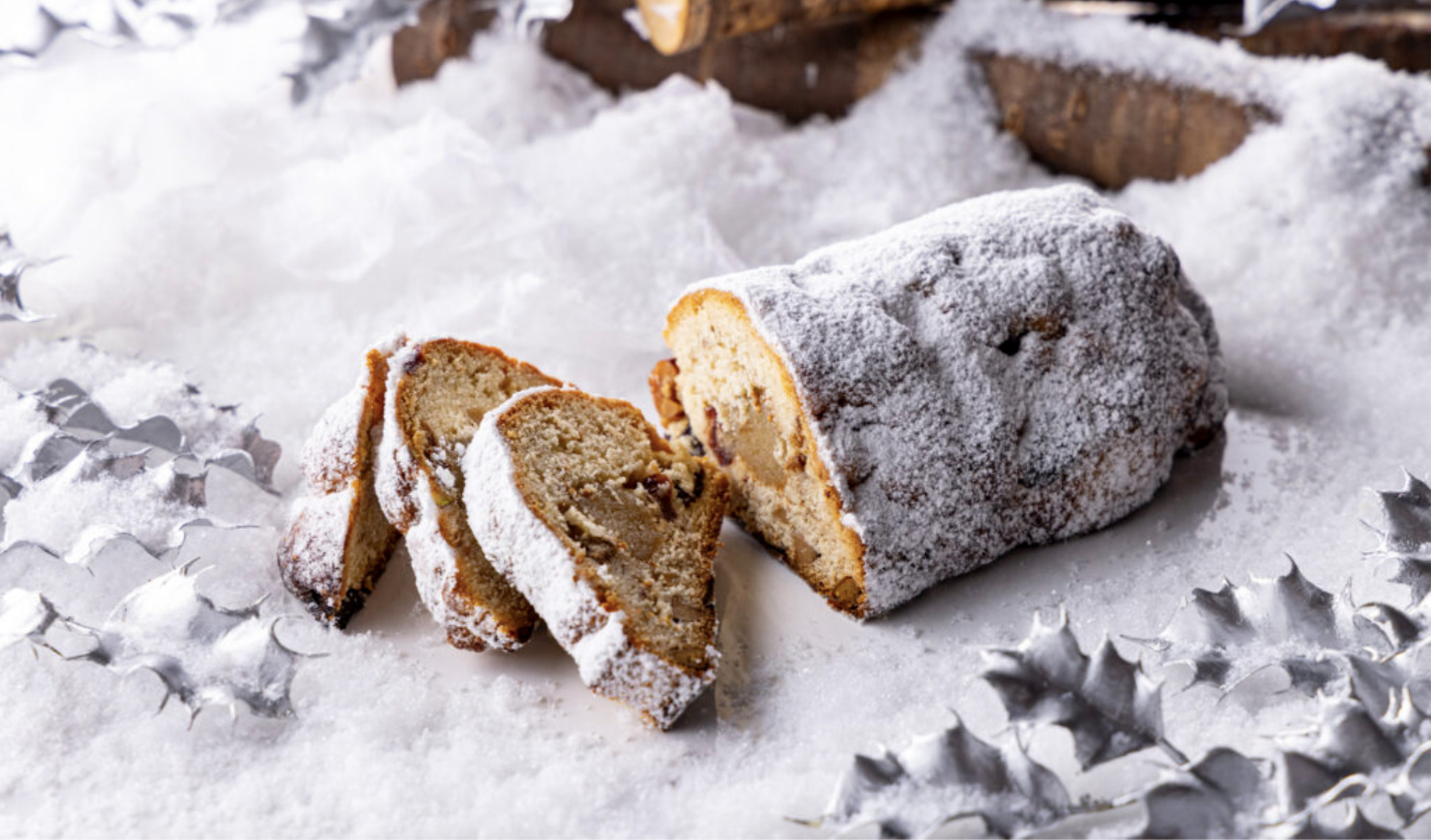


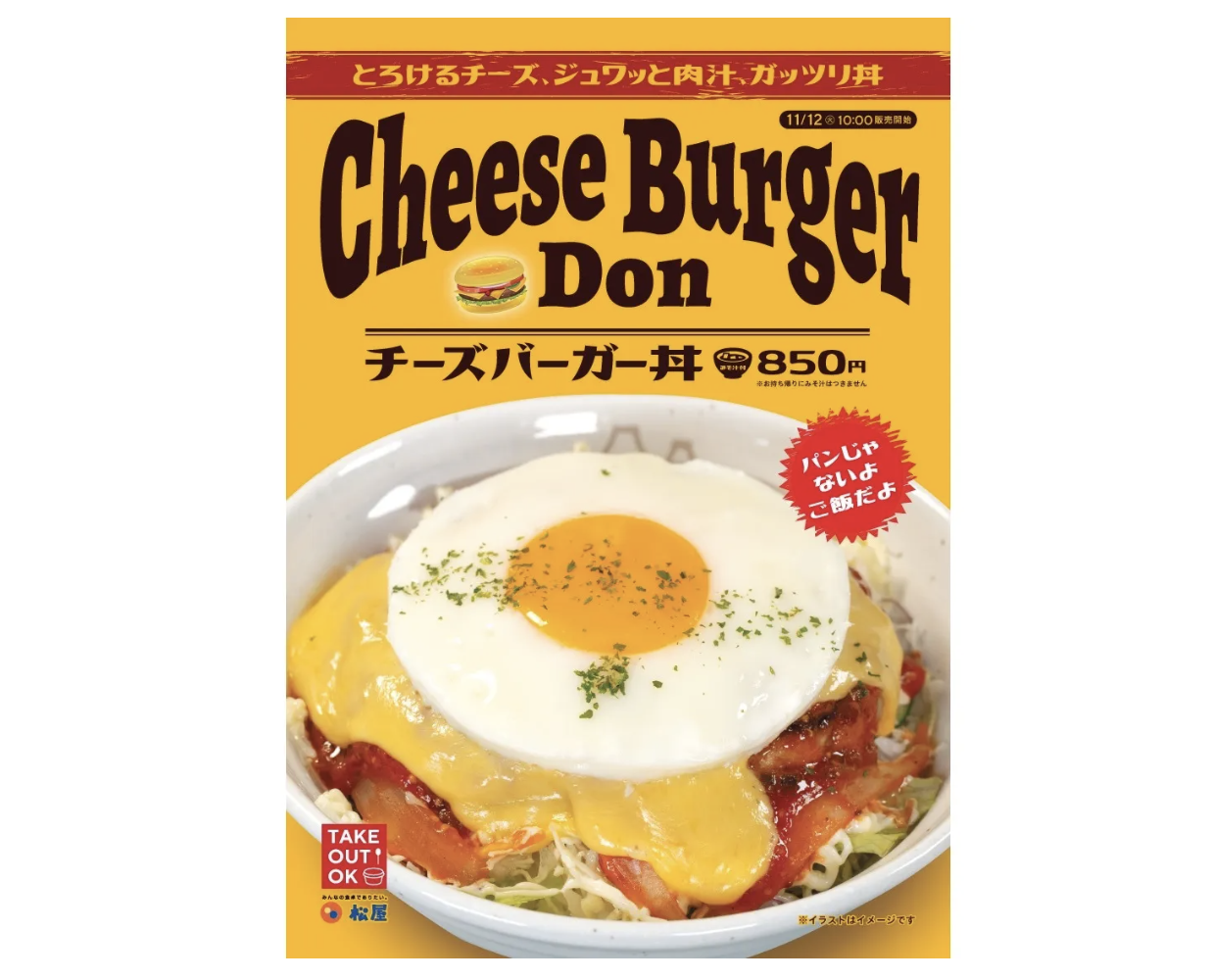


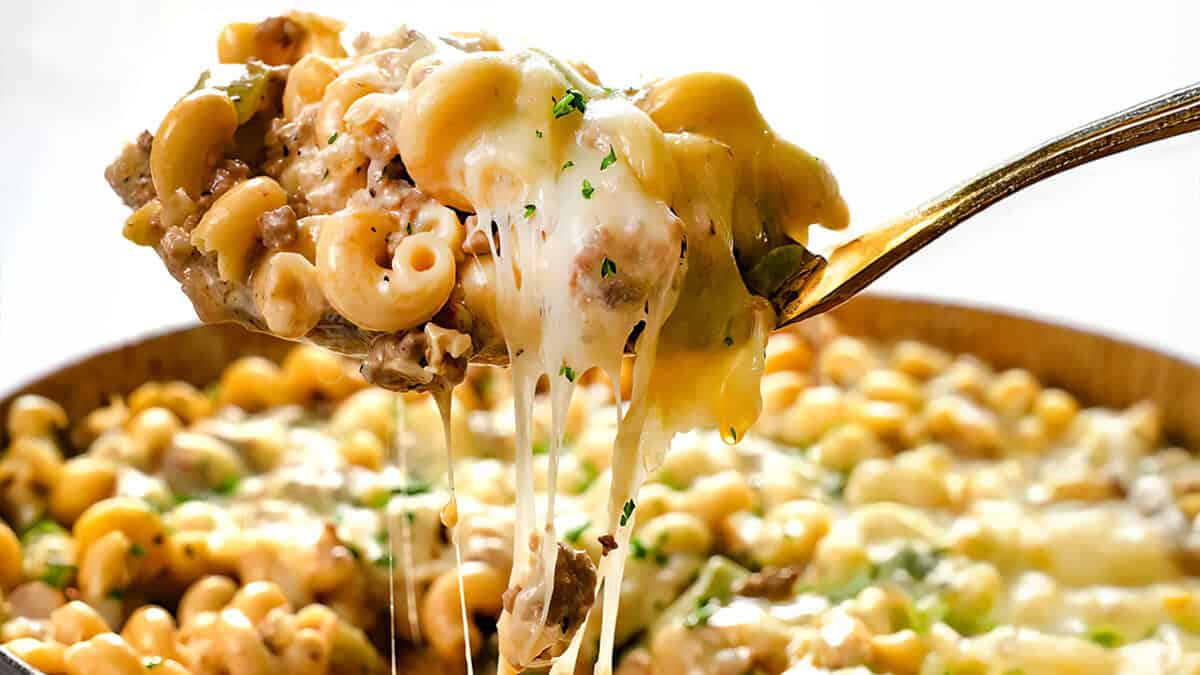
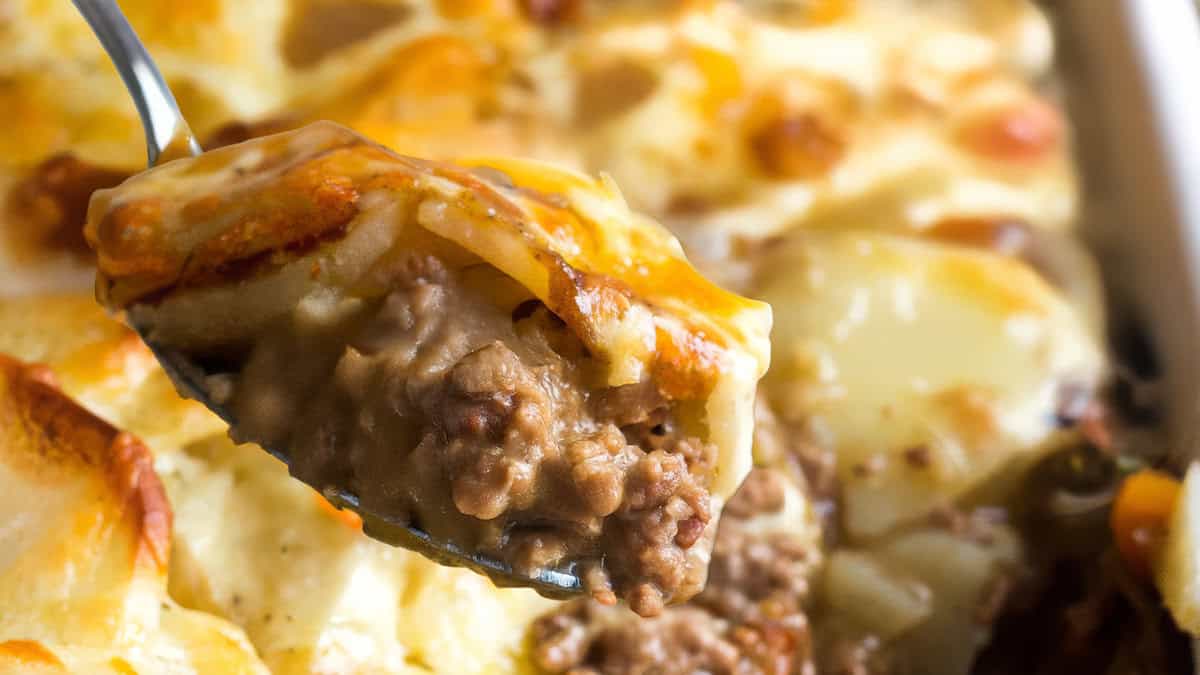

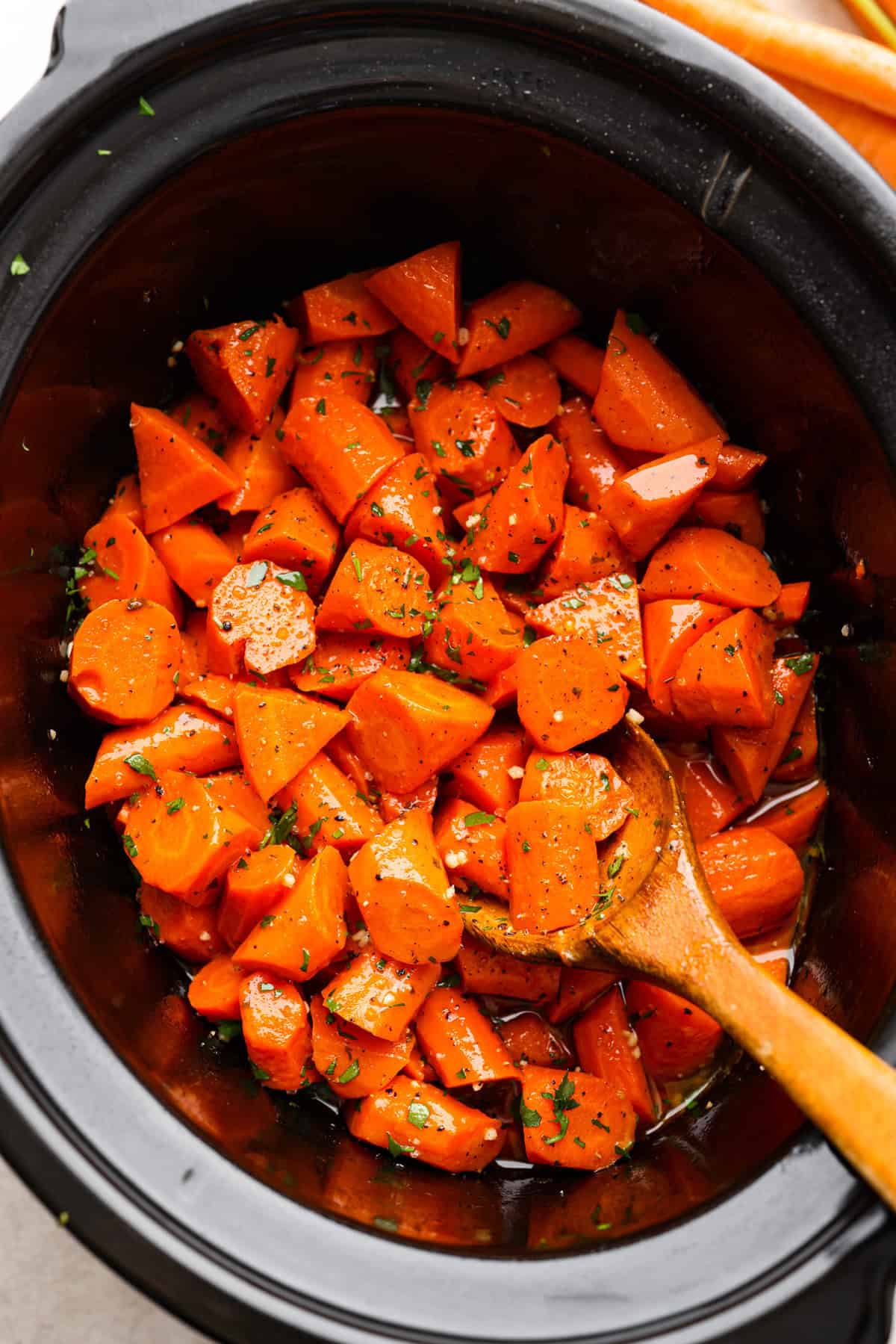
 English (US) ·
English (US) ·